#meanwhile Horace just trying to live his life.
Text
Ranger To-Do List.
Drink coffee
Evoke fear, mayhem, madness, drink coffee, chores, disturb barons, spook kings, drink coffee, stop and start wars/international crisis, drink coffee
Drink coffee, never sleep, repeat.
I've got it basically correct, right?
#Halt yes I'm looking at you. Begin a war AFTER breakfast#meanwhile Horace just trying to live his life.#help#halt o'carrick#funny#will treaty#john flanagan#rangers apprentice#incorrect rangers apprentice#rangers#coffee is life#damn rangers#ra#international crisis#wars#gilan davidson#crowley meratyn
39 notes
·
View notes
Note
AU where Quirin takes and raises Eugene after the DK falls
•| Send me a potential AU and I’ll tell you five fun facts |•
Oh you have no idea how much this enables me - I stand by Quirin raising Eugene until the end of time bc it’s what they BOTH deserve
1) Oki so, here we see Eugene taken away as a baby without disclosing an EXACT location — that will not stop Quirin though, who had a stance against cutting him off completely despite it being Edmunds orders [It made sense to send the boy away but to send him to an ORPHANAGE was another story] Quirin finds Eugene a month or so after they get separated, during that time he found a house and a stable farm to raise a kid on [Gotta have an income] and then promptly goes to the orphanage and adopts Eugene.
By then, Eugene’s name has already been changed and frankly... Quirin thinks it suits him, though he occasionally slips up and calls him Horace. He feels a duty to raise the Prince but also kinda has a “My son now” mentality! Disagrees with Edmunds choices + decides... His kingdom is doomed, so he’s gonna ensure Eugene gets a stable upbringing with KNOWLEDGE of the Dark Kingdom without necessarily telling him “Oh BTW you’re the prince”. Being a father is hard and he struggles a lot, esp in early days, it’s a whole new challenge from being a knight but... Not one he really regrets?
Cue some fluff! Knight-dad trying to raise a baby and establish a life in a new country — Over time he grows and becomes Village Leader + Develops a bond with the monarchs based on his knowledge and previous high-rank in society from being a knight! Gets offered a guard position but turns it down in favour of spending time with his toddler son. Eugenes first word is Dada and Quirins never felt so content. Baby fluff of Eugenes milestones — Quirin has Eugene helping on the fields as soon as he can toddle without tripping (tho it’s mostly Eugene playing and running around while Quirin works) Toddler Eugene is a little darling and knows exactly how to use his cuteness to get praise and sweets
2) Eugene starts thievery / acting out soon after Quirin dates and marries Ulla, though it soon become a hobby he usually indulges in with his friend Arnie [though they take on the names of the coolest book characters Flynn Rider and Lance Strongbow!] Quirin thinks it’s just a phase and leans into the whole calling Eugene ‘Flynn’ because... He really loves the books, that’s not too odd? Though he doesn’t know of crimes + just thinks they go out to play a lot. Eugene ignored Ulla for the first few weeks because he doesn’t like the idea of someone new staying around — He doesn’t hate her, it just raises a lot of questions about his mum that Quirin doesn’t know how to answer... He resolved on the explaination that she was very sick and couldn’t take care of him anymore, though loved him dearly — it’s enough to placate him.
Eugene doubles down on stealing when he’s 10 and suddenly there’s gonna be a new baby in the house. [He doesn’t WANT a sibling + worries Quirin will love the baby more than him since he knows he’s adopted & all that though is too scared to ask] Eugene grows an attitude and Quirin finds himself exhausted and constantly caught in petty bickers as Eugene keeps running away + acting up, especially to his wife (Who loves Eugene very much, of course) ‘Flynn’ declares he wants to travel the world and be far away from step-mums and nasty babies, uhhh Domestic fall out stuff?
Things change when baby gets here and suddenly Eugene is a big brother and Quirin is MORE distracted, sometimes they forget to even read him a story and he can’t stand the squirmy little creature... All it does is cry and take what little attention his misbehaviour had earned him... So naturally, petty crime continues + Eugene starts caring less about getting caught, so it becomes more risky. He and Lance befriend some bad influences and start taking Big Kid Crime. It’s fun! Until Eugene is brought home by a guard and Quirin gives him the silent treatment for the next week. Quirin... He loves his sons, both of them, but he just isn’t sure how to handle a distressed 11 year old and a baby, it feels like there’s not enough hours in the day and Eugene is SET on making life harder for everyone.
Eugene stays against ‘Varian’, frequently makes the baby the villain in his games and makes him cry on several occasions. It gets even worse when he starts crawling bc now he can’t get anytime alone, it’s just frustrating! The solution probably comes when Varians starting to talk and he says ‘Oo-gee’ as one of his first words — ‘Lisa’s first word’ style — and Quirin and Ulla admit that Varian is obsessed with Eugene. It’s sorta a wake up call for Eugene to start trying to get along with the kid, and it works! He finds it fun to teach him things & have someone to talk to (even if he just babbles back) By the time Eugene is 12 he’s calling Ulla mum and love spending time with his little brother
3) Right! When Eugene is about 18 he picks up theiving again, mostly because he isn’t suited to the farm life and it’s easy money (Plus how else is he gonna achieve his dream of financial independence?) He moves out the farm under the guise of finding a new life with his best friend, though they quickly realise it’s not amazing when they get tangled up with the Baron + his antics. Eugene visits home every so often and claims everything is fine, it’s going great, he doesn’t need any extra help + his life is just dandy. His dishonesty mostly bc he doesn’t wanna worry Quirin and there’s been a bit of a strain since Ulla passed away.
Life keeps on like this. Eugene ages, steals alchemy supplies for Varian and hides his true income source because he wants to make Quirin and Varian proud! Varian grows up to be more headstrong in what he wants because he has someone standing up for him and telling him he’s proud, though the longer Eugene spends away the harder it gets? He loves it when Eugenes here! But the house feels empty without him, and Quirin is so busy + stressed from Varians experiments that there’s still that desire to do more, prove himself.
4) Movie diverts a bit! Eugene finds out about the hair glow and thinks... If one person knows about this then it’s him, and takes Rapunzel to Old Corona over night rather than a campfire. Varian is ecstatic to see him though gets confused by a random girl Eugene claims to have just found — He’s about to ask questions when Eugene asks if Varian could do his magic thing to find out about her hair. Varian insists it’s alchemy and agrees, dragging Raps down into the lab! Boop gothel talks to her when Varians gathering all the equipment and talks her ear off about how cool Eugene is and asks how they found each other since the story is weird... Experiements start!
Meanwhile Eugene is talking to Quirin, when Quirin pulls out a wanted poster and puts it on the table. He finally found out about how bad Eugenes crimes are and wants answers. Now. Eugene sits and tries to explain its not what it looks like, but Quirin doesn’t wanna hear it. The disappointment is evident and Quirin criticises “I thought you grew out of this, what role model is this for Varian?” Eugene doesn’t have an answer but argues his case that it was to be reliant — and he doesn’t wanna do it anymore anyway! Quirin accuses him of using the girl, while Eugene insists her name is Rapunzel and he’s just helping her, get the crown, be set for life and never have to bother him again.
Their argument is cut short by a Varian coming back upstairs looking frazzled, says there’s something about the magic that’s familiar but he can’t place it — sure is strong tho, and continues gushing and asking Eugene for all the details of what he’s been up to. Eugene... Explains, his usual light-hearted rendition of a great quest, while Quirin leaves and stays upstairs the rest of the night.
Varian sees them off in the morning! Hours after they’re gone Vari is still looking into the magic thing — that’s when he remembers the old legend about a sundrop... about how it saved the Queen... About the Princess. Varian sneaks out the house and heads up to the lantern festival to tell Eugene and Rapunzel his revelation, but he gets there just as Eugene is being lead away by guards. Varian finds Max and tells him how they need to free Eugene + basically... Helps him escape with fewer pub thugs and more alchemy. When they get to the tower Eugene tells Varian to stay on the floor and climbs up to help Raps - Varian stays at the bottom of the tower for approx 10 minutes before finding the back entrance and climbing up. Figure he gets there just as Gothel deages, it’s suddenly and before anyone knows it Varian is the one pushing her out the window bc he saw a stabbed Eugene and put two and two together. Then! Cue New Dream scene, except Varian is sitting on the floor in shock a distance away... After New Dream hug Eugene looks at him and Varian admits that “Ok, magic isn’t that bad”
5) Oh god the series! First off — Raps is closer with Varian in this (that’s becoming a theme...) so doesn’t just throw him out into the blizzard when he comes asking for help. Instead he and Eugene go back to Old Corona together after the storm, Varian isolates himself from guilt + has a tough time dealing with what happened, but he lives in the castle as Eugene starts getting angrier with the king and wants answers for what happened. He’s the one that finds Dark Kingdom stuff and he and Varian work on it together... Eugene has a suspicion he came from the Dark Kingdom so when the rocks start pointing there he’s like dope!
No villain Varian joins them on the trek to the Dark Kingdom + it’s all fun and games, Eugene tries to get more answers from Adira as they travel but she says it’s not her place to say... All he needs to know is the kingdom fell, and everyone was evacuated... She’s almost annoyed as she explains it, then Hector is treble annoyed when he finds out Eugene was raised by QUIRIN since that went against the direct orders... Though Adira defends it and says he was doing his duty of keeping Eugene safe, it’s basically a rift between them that’s confusing until they get to the DK and the revelation happens.
I feel... Moongene could be a thing in this AU? but since I’m running out of points I’ll leave it with Cass taking her canon role! I will point out! when Quirin is freed initially only Varian runs into his arms... Eugene hadn’t really spoken to Quirin properly since their movie fallout & he’s not sure he belongs... Until Quirin holds and arm out to him and pulls him into the hug too (PARALLLELS) and we get a happy reunited family (tho with some issues to work out regarding somethings... they need to rebuild trust, but work on it slowly. Edmund stays ‘Edmund’ to Eugene. He sees Quirin as his father & doesn’t push as much to reconnect with Edmund... Though that makes it easier in a way. There’s less pressure once Edmund understands and they form a friendship, but Quirin is Dad 100% (Sometimes Edmund gets called Dad 2))
78 notes
·
View notes
Text
Tangled Salt Marathon - The Return of the King

So we’re back to the quasi-filler stuff. This episode does set a few things up for the finale, like bringing Edmund to Corona, but none of those things are actually good and it’s still mostly filled with irrelevant shit alongside the more important stuff.
Summary: King Edmund arrives in Corona to see his long-lost son, Eugene, and to give him the royal sash of their bloodline. Eugene wants nothing to do with him, but Rapunzel invites him to stay. Later, the sash is stolen and a ransom note is left behind. Edmund and Eugene decide to go and retrieve it. Meanwhile, the Stabbington Brothers plot revenge on Eugene as they are both viewed as a joke by the other criminals.
So How Did the Stabbingtons Escape the Prison Barge
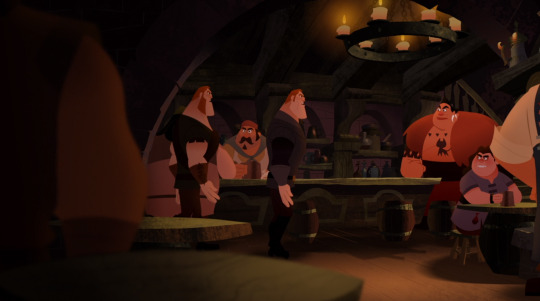
Last we saw them they were stuck on a prison barge along with Lady Caine and all of the other season one villains. How did they escape? Did Lady Caine or anybody else make it out? If so then where are they this season?
We’re not going to get any of those questions answered are we?
Man this is just sloppy continuity. Which ironic, because these two were only brought back this season because of continuity. They need to be “redeemed” so that they can be at the wedding. I guess it just sucks to be you if you’re an original villain for this show and not named Cassandra.
Why Is This Deserving of Ridicule?
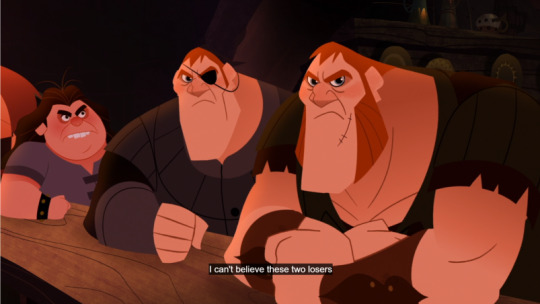
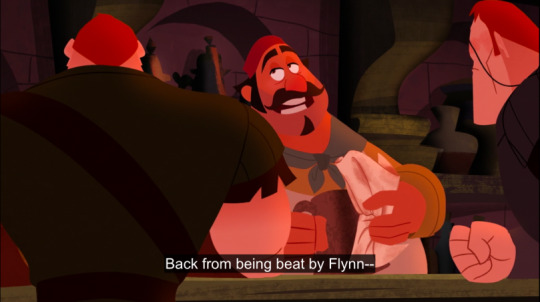

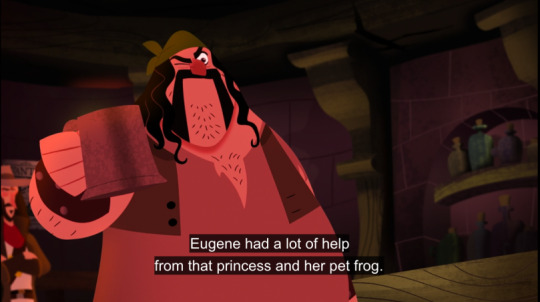
Like...We’re talking about a world renowned thief and adventurer and his magical royal girlfriend who are well known enough outside of Corona to be mentioned and there for no doubt people know how they both defeated monsters, daemons, and several criminals besides just there two guys, right?
This plot point makes no sense.

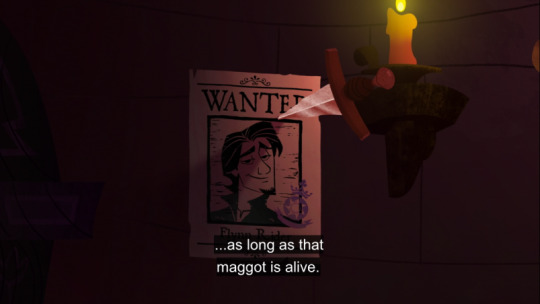
You could just kick these dumbasses butts and be done with it. I doubt they’d bother picking on you again if you did.
Did we really need even more motivation for them to want revenged against Eugene?
Rapunzel is Back to Being Her Bossy Self


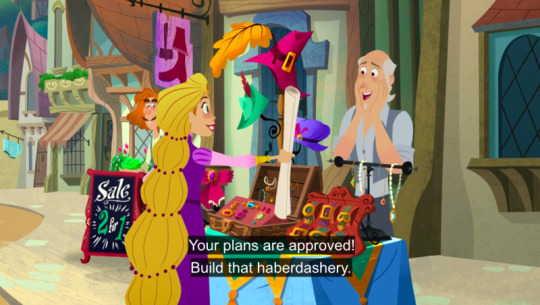
Rapunzel has not earned the role of “wise administrator” yet. She’s only been out of the tower for two years now and she has yet to prove to the audience that she has managed to learn anything since then. By jumping the gun and forcing her into a role that she hasn’t grown into, and by ignoring that this whole show started out as a coming of age story, it just makes Rapunzel unpleasant to be around. All her “advice” is just her ordering people about with a veneer of chipperness to try and mask her controlling nature. People who should know more about their own lives than she does and have no reason to listen to her.
So We’re Showing Rapunzel Being Responsible... By Having Her Avoid Responsibility?


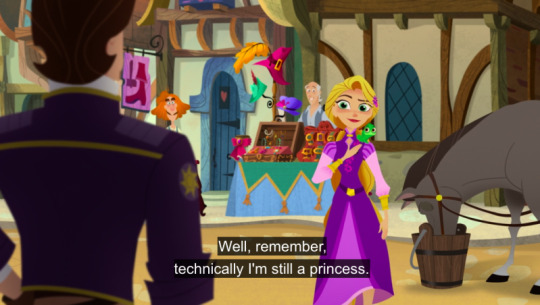

Part of why the writers made her “acting queen” for the first half the season was to get her to grow into the role of becoming full time queen. However they screwed this up by not having her actually learn anything and having her avoid the real duties a queen preforms.
What Rapunzel is doing her is just being a socialite busybody. The only administrative thing she does is approve some low-scale building plans for a small business. A thing that would have been handled by a lower official in an actual functioning government.
Once again Rapunzel is being selfish and doing what she like, ie bossy people around while having them kiss her ass, as the real work of running the kingdom is left to someone else. This isn’t being responsible, it’s being hypocritical, but don't expect anyone to ever call Rapunzel out for this.
Pointless Action Scene is Pointless

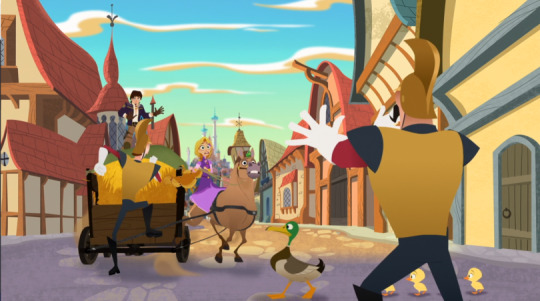
At this point, the low stakes action sequences are just cringe. Like is this an adventure show or not people? Stop forcing crap like this and give us some real conflicts instead.
How Did You Get Here So Fast Edmund?

It took Rapunzel and company nearly a year to get to the Dark Kingdom. Even if Edmund wasn't delayed with pit stops like they were, it would have still taken him several months to get here by horse.
Did he take a boat, or have four to six months already past since Rapunzel’s Return?
I would argue that this episode was aired out of order and should have been later in the season, but Cassandra’s appearance at the end of this story, and Hamnuel’s appearances in later episodes, would suggest otherwise.
Crap like this is why season’s three timeline doesn’t work unless you stretch everything out to two years instead of one.
Read the Room Rapunzel




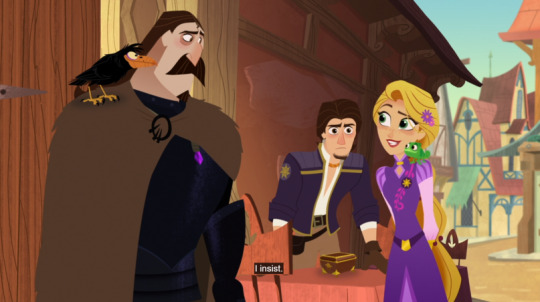
One could argue that Rapunzel is just trying to be polite, but that doesn't really hold water.
For starters Eugene is clearly upset and has every right to want to set boundaries between himself and Edmund. Ignoring that is incredibly rude and if my significant other ever did such a thing, well they wouldn’t be my significant other for very long.
Secondly, Rapunzel could have offered other accommodations if she felt pressured to be polite to Edmund. Not only are their lots of inns in a port town known for trade, many of which are probably well-to-do, but there’s also that convent that was mentioned back in season one. It has to be somewhere in Corona itself and as the so far only mentioned major religious organization in the country it would no doubt have stately quarters for when royalty and nobility would visit.
So not only would it be a suitable place for a visiting king to stay in, as it would be made for such things, but it’s also far enough away that Eugene wouldn’t feel like his space is being invaded but close enough that Edmund could come and go as he pleases.
By that point it’s still between Edmund and Eugene and Rapunzel can stay out of it, like she should.
Eugene is Right
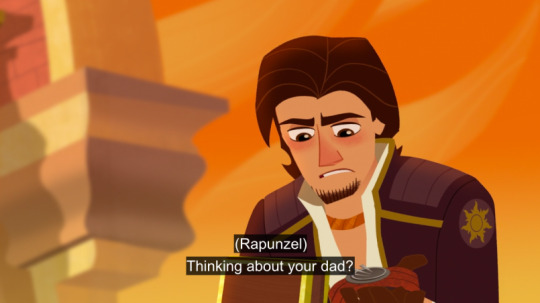
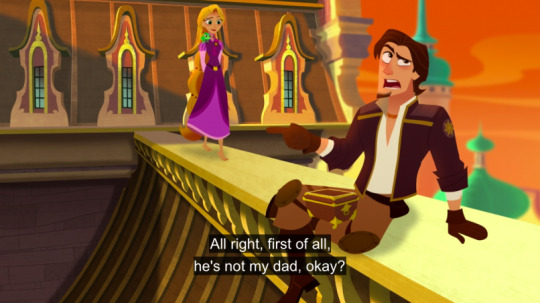
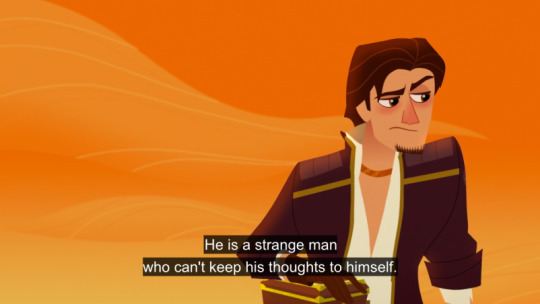
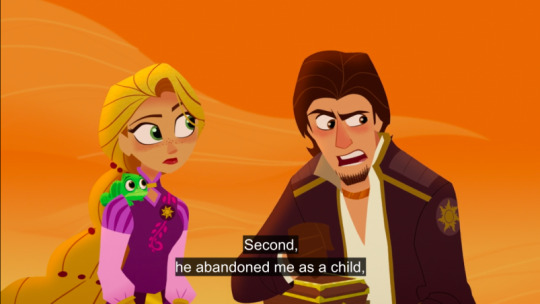

These are all valid reasons for cutting someone out of your life. Furthermore, you don’t even need a reason. If you don’t want to associate with somebody then just don't associate with. It’s your life. You don’t have to justify how you choose to live it and people who actually care about you should respect that.
Unfortunately no one respects Eugene.
Not Edmund, not Rapunzel, and most certainly not the writers.
Then Why Don't You Get Closer to Edmund, Rapunzel?




I understand Rapunzel’s viewpoint here. Edmund is the only person she’s ever met who has experienced the same isolation that she has. He’s one of the very few people whom she can empathize with.
However that doesn’t give her the right to force her views upon her boyfriend. If she cared so much than she could just befriend Edmund herself and leave Eugene out of it.
Trying to encourage a child to have relationship with a parent who neglected them is super tone deaf at best and outright disrespectful at worst. It’s also highly hypocritical seeing as Rapunzel cut Gothel out of her life for similar reasons and Eugene only ever supported her for it.
No really, flip the situation. If Eugene tried to encourage Rapunzel to give Gothel a second chance everyone would be slamming him for it. So why does Rapunzel get a free pass?
Shorty Already Did That, Eugene. Don’t You Remember?
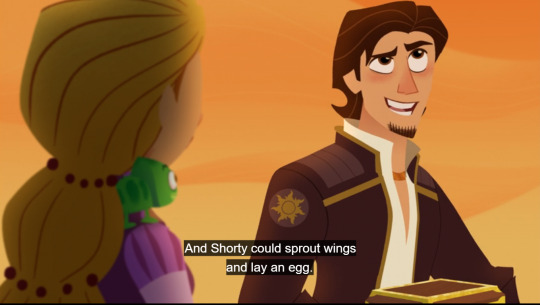
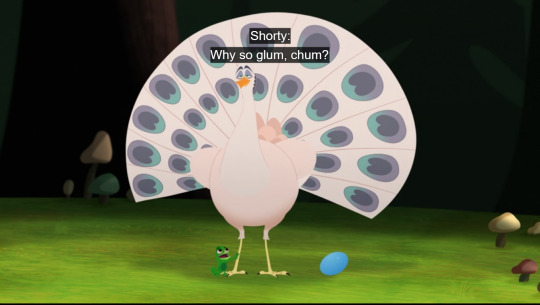
I mean, you were literally right there when it happened. Are we forgetting season two the same as season one now?
So Why Are Stan and Pete Suddenly Back, But Not Cap?
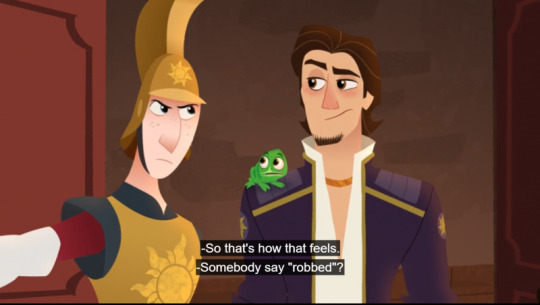
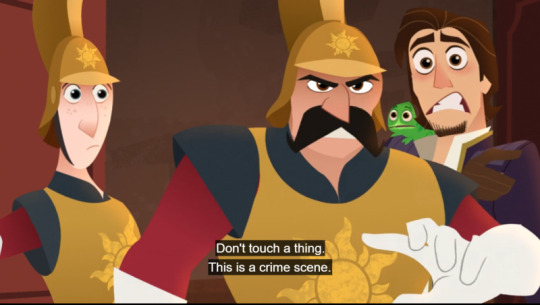
I mean we went through all that trouble in Rapunzel’s Return to write them out of the narrative and here they are without any explanation. Why are simple set ups so dang hard for this show?
Rapunzel is Overstepping Her Bounds Here



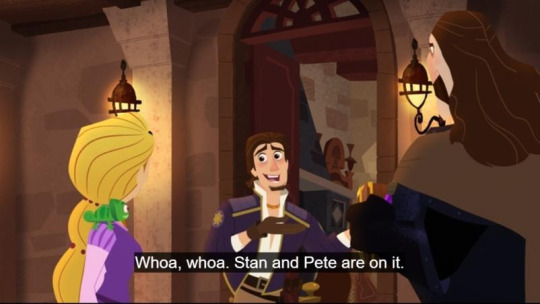
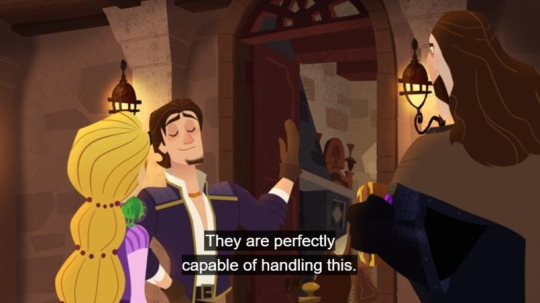

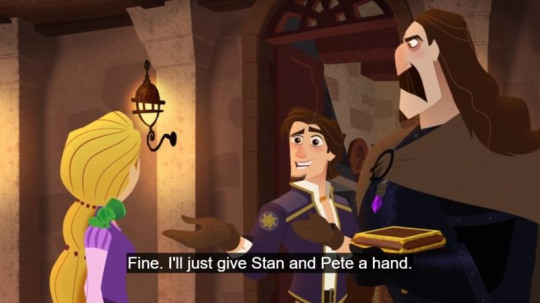
Ok, giving Edmund a place to stay is one thing. Suggesting to Eugene that he should give Edmund a chance is not appropriate but still forgivable. But this?
This crosses a fucking line!
Eugene is not Rapunzel’s subject. He’s her boyfriend, and a prince in his own right. Rapunzel can’t just volunteer him for crap without his consent. That’s just indirectly ordering him about like she would a servant.
Once again, flip the script. If Eugene tried to force Rapunzel to work with Gothel everyone would be up in arms. Why is this then deemed okay?
This is Coercion
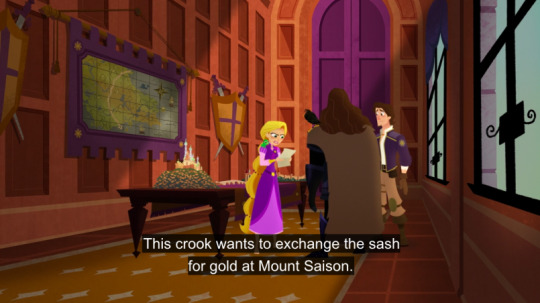

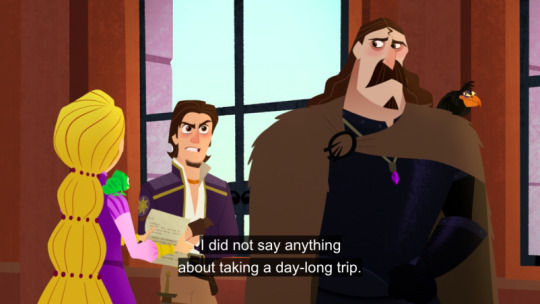
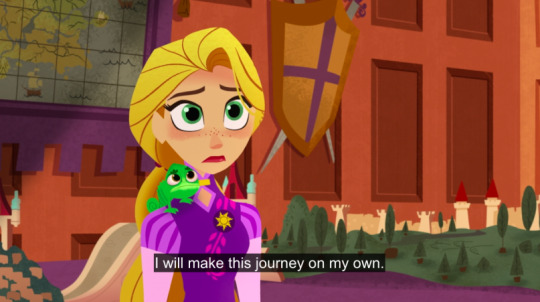


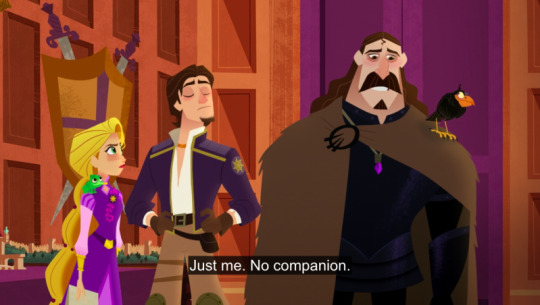
Not only is Edmund and Rapunzel trying to guilt trip Eugene here but she even fucking elbows him!
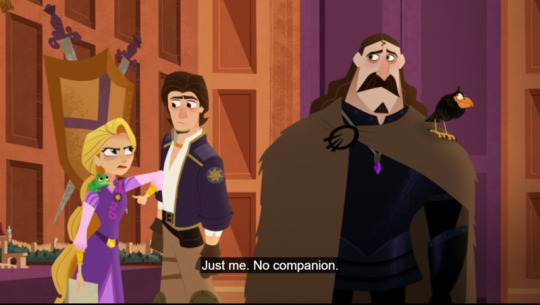
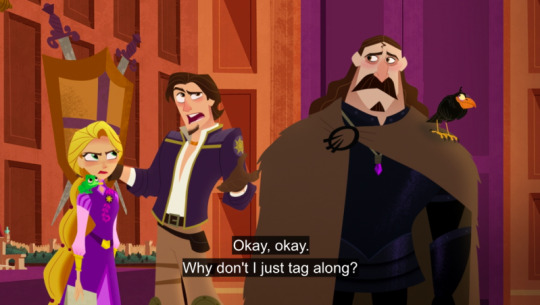
Like this isn’t “cute couple bickering” here. That kind of stuff is reserved only for inconsequential shit.
This a woman trying to strong arm and guilt trip her husband to be into having a relationship with his abusive father! Because guess what? Neglect is still abuse!
Rapunzel has zero say in Eugene and Edmund’s relationship. It’s none of her fucking business! Trying to force her into this plot just makes her look like an asshat.

I mean look at this smug smile! The fucking bitch is proud of being a shit human being and a terrible girlfriend.
And of course don't expect the show to call out this behavior as wrong because of out of date sexist double standards. If you think any of this is okay then just role reverse Eugene and Rapunzel here and then tell me its still alright.
The Show Missed a Real Trick By Not Naming Him Horus Instead
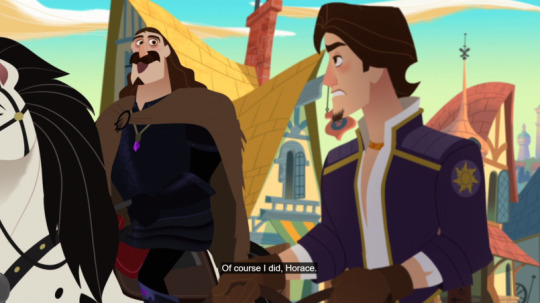
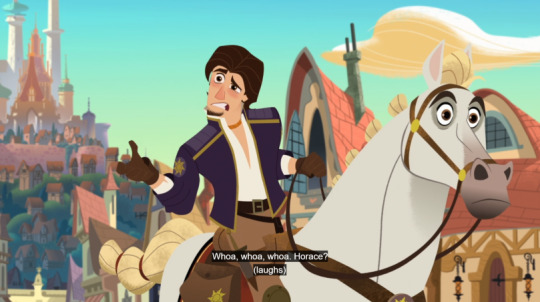
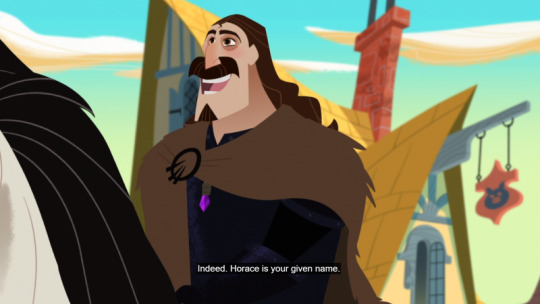
Horus, the sun god, would have been a nice bit of irony and given meaning to the name while keeping the joke virtually unchanged. You could have had both lore and a punchline.
And I would argue that the joke as is, isn’t even funny. Horace is indeed a lame name, but not for the reason that the show gives. It’s lame because it’s not unique enough. There’s already a Disney character named Horace and I’m sure there are real people out there with that name as well since it’s not completely unheard of. So the joke falls flat and winds up insulting anyone with that name.
Don’t Expect Any Pay Off for Eugene’s Identity Issues This Season
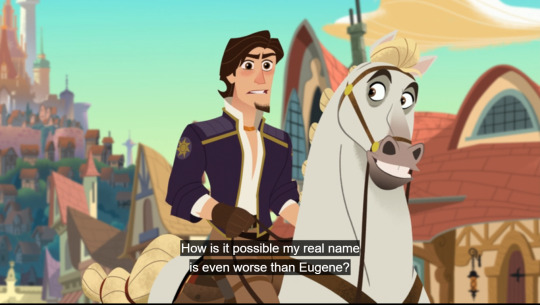
Yeah the show makes a big deal out of Eugene having a mid-life crisis through out season three, but then never resolves it in any meaningful way.
Edmund Is an Asshole
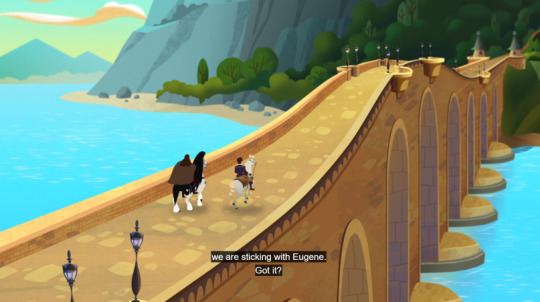
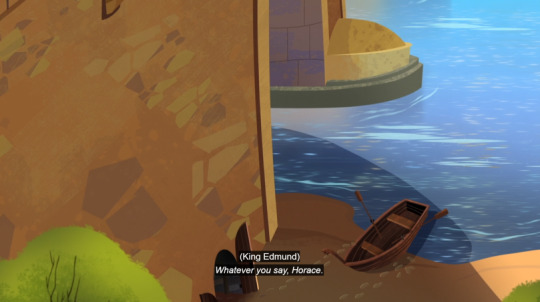
I don’t care how “crazy” he is. Calling someone by a name they don't wished to be called is just plain rude. Acknowledging someone’s preferred name is just a basic common courtesy that is expected of everyone. Once again, this isn’t funny, quirky, nor charming, just unpleasant.
So the Animators Wasted a Model on a No-Named Character Who Only Appears Once
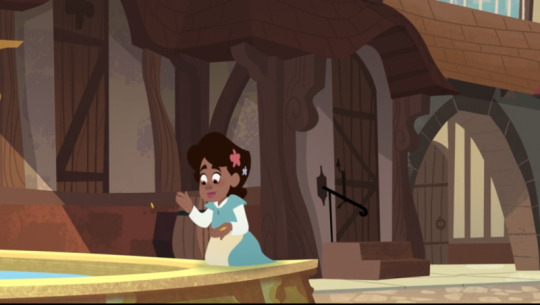
Someone said this little girl appears in season one, but it’s not noticeable if she does. She also doesn’t have a name and this is her only speaking role. What a waste of money. Just have one of the braided girls from the movie instead. You already built models for them and haven’t really used them.
And before some mentions race here, this is poor rep already cause the character has no impact.
Turns Out, Varian Didn’t Even Need Those Truth Serum Cookies
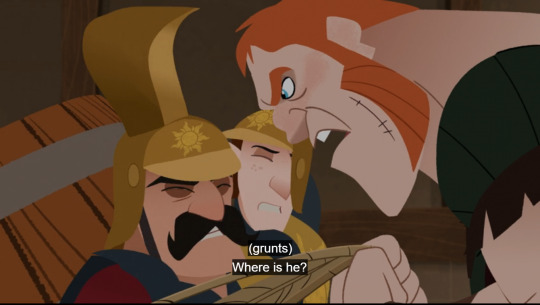


Not only does this dumb down Pete to a ridiculous degree, but it also invalidates everything Varian went through in The Alchemist Returns and the grief he got from everyone for using the truth serum.
Oh, and it’s also lazy writing and a plot contrivance.
That’s Not Figgy Pudding!

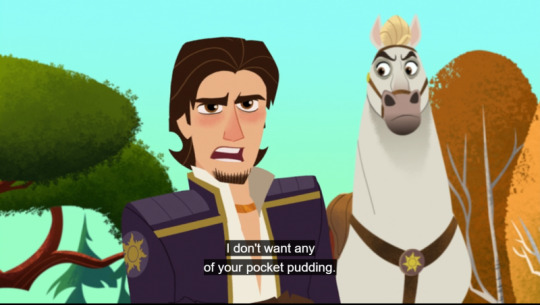
This is Figgy Pudding.
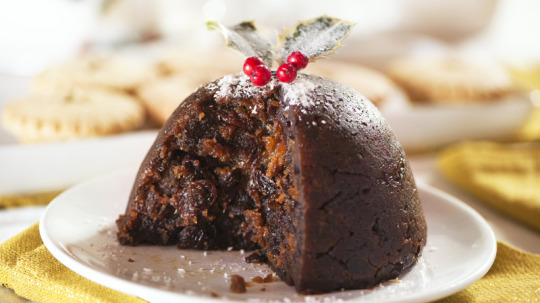
It’s a boiled “pudding” that’s more like a cake with dried fruit in it. During the 14th through 18th centuries such bread puddings were made to be carried around in ones pocket or knapsack for eating on the go. They’re nothing like the creamy custards we call puddings today.
It also looks nothing like what’s shown on the screen below.
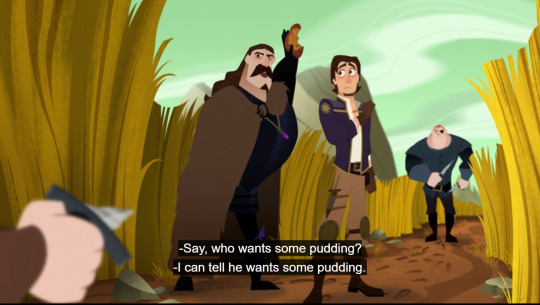
That’s like a half eaten loaf of wheat bread?
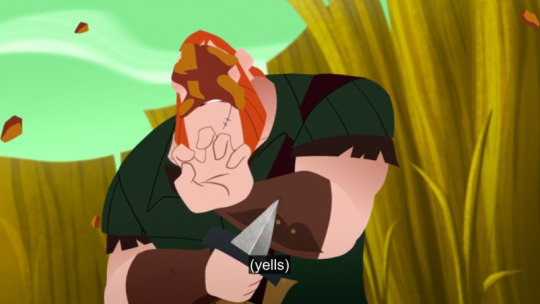
That’s jelly filled .. apparently...?
Once Again, If You Have to Make Everyone Else Incompetent to Make Your Hero Useful to the Plot Then You Need a New Plot
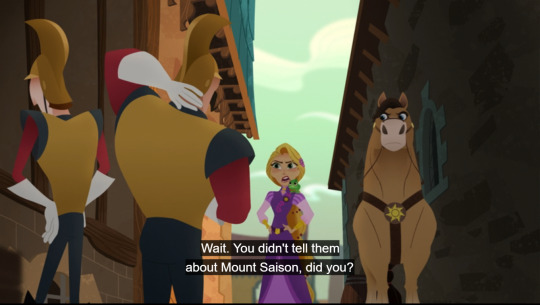
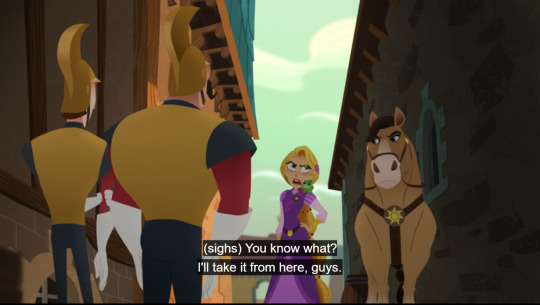
Rapunzel has zero business in this plot. She doesn’t even need to be in this episode beyond a cameo. Trying to cram her into the protagonist role in a conflict that doesn’t involve her is just a disservice to everyone.
Winnie The Pooh Is More Mature Than This Show


More of that meta commentary I was talking about last episode, and it just as full of shit as ever.
Seriously Find Her, Keep Her is the best script I have ever seen in any show. It’s perfectly balanced so that anyone of any age can relate to it. It’s real and heartbreaking and perfectly suitable for small children to understand. There’s no shock value, no darkness, no modern satire, but its far more mature and complex and deep than anything TTS has tried.

Also Rabbit is a far better father than any dad in this show, while still being cut from the same trope. There’s no shame in being a children’s show when its done well and this now 30 year old kids show runs rings around what ever mess Tangled is trying to sell.
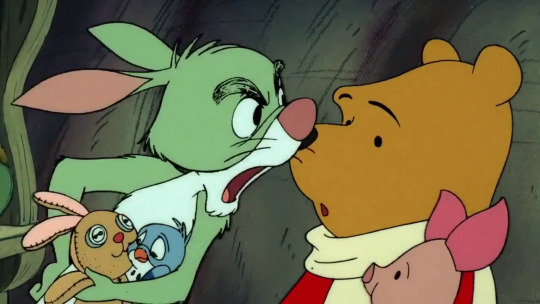
Eugene Isn’t Exaggerating Here and I Don't Know How to Feel About That

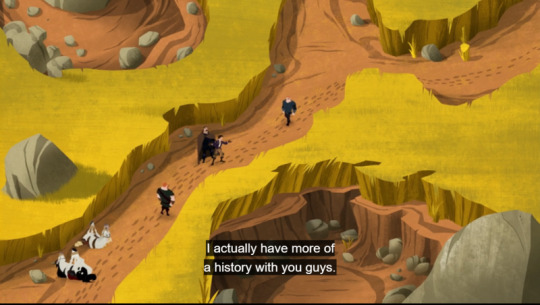
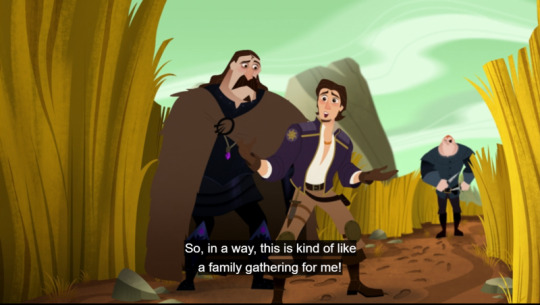
Turns out Eugene did grow up with these guys the same as he did with Lance. It’ll be confirmed only two episodes later. That just recontextualizes everything. He didn’t just betray some rando guys that he held no feelings for, he betrayed people that he’s known and worked with since childhood.
Now just because he’s known them doesn’t mean that they were family to him like Lance, but like the fact that he keeps claiming then as such through out the episode would suggest that perhaps they were like siblings.
That’s ... ingenious. That makes Flynn Rider retroactively an even worse person and gives the Stabbingtons real reason for vengeance.
Only the show doesn't do anything with this! It just makes Eugene an even bigger jerk in the movie for zero reason.
Let Me Reiterate, Edmund Is an Asshole
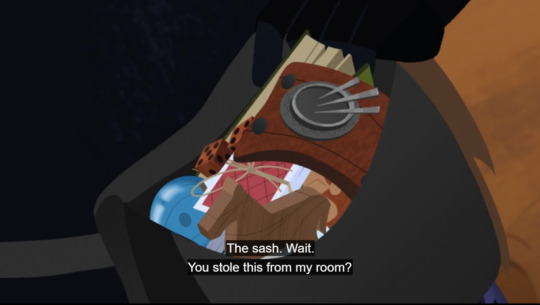
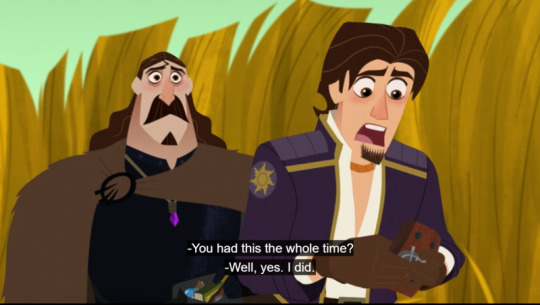
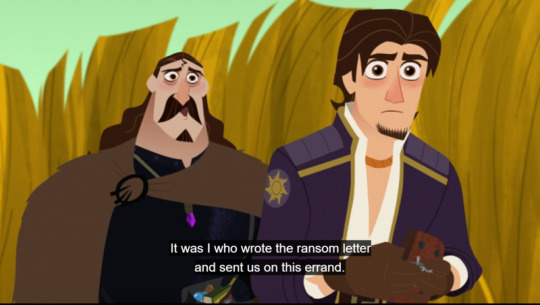
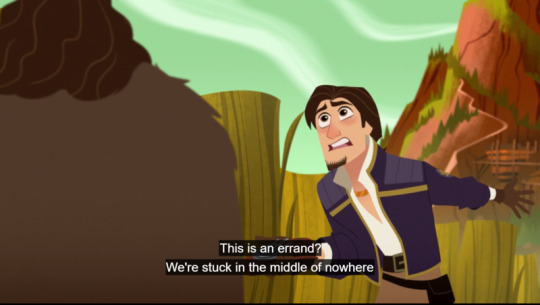
Just like with Frederic, Cassandra, and Rapunzel the show uses framing to try and make the audience side with people who do unforgivable things.
Edmund is an abuser. He neglected his own son for 25 years. But the show presents him as “funny” and “quriky” and “look at his pouty face, he’s so lonely”....
No!
Edmund isn’t deserving of anything and how he treats Eugene here is garbage.
This show is utter crap writing wise but boy does it know how to gaslight its own audience into siding with bullies and abusers.
Eugene Is One Thousand Percent In the Right Here, But Don’t Expect the Narrative to Acknowledge That
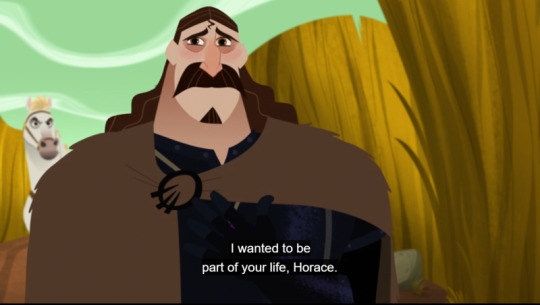

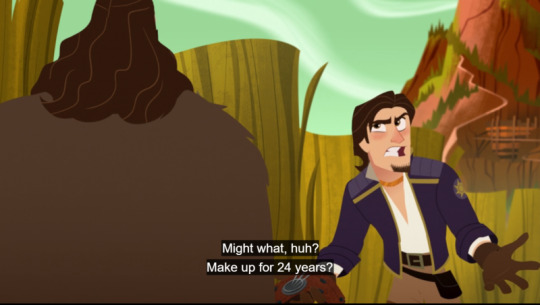
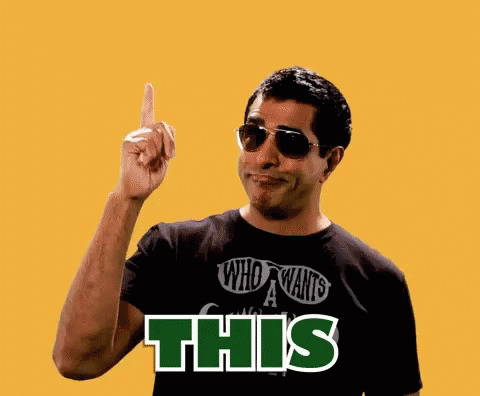
There’s nothing you can do to make up for that.
Eugene might forgive him. Eugene might move on from it. Eugene might decide a relationship it still worth having with Edmund. But the horrible thing still happened and it happened because Edmund allowed it to happen. There’s no going back from that and everything going forward has to be on Eugene’s terms alone.
But the narrative won't allow Eugene that agency.

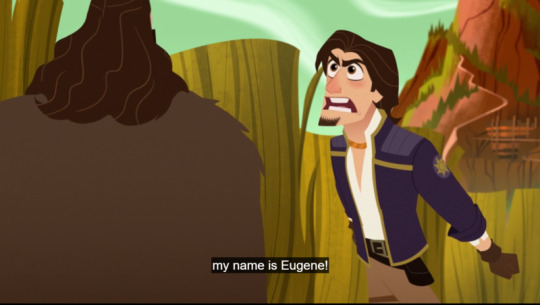
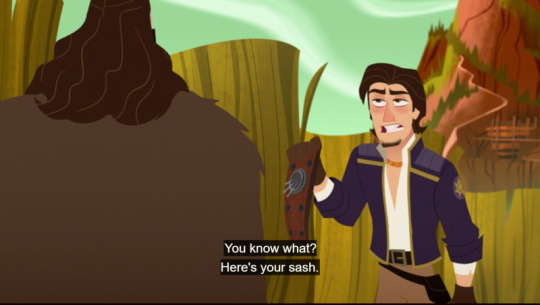

Even as he makes his grand proclamation about being done with Edmund the cameras chooses to focus on Edmund and his feelings. The story is already priming the audience to prioritize Edmund over Eugene so that when the forced and contrived forgiveness scene comes we won't question it. But it only comes because Chris doesn’t deem Eugene as individual person with thoughts and feels of his own, but as an avatar to fulfill his wishfulment fantasy regarding his own personal daddy issues.
Rapunzel’s Characterization in Season Three is Just....Off


Ok, even ignoring the major stuff, like not recognizing what she’s done wrong, putting her into roles she’s not meant to carry, and making her a shitty girlfriend suddenly, Rapunzel just behaves contrary to her character all through out season three even in small subtle ways like here.
On the surface this seems like a clever call back to Great Expotations, but lets examine more closely, shall we.
On one end we have yo-yos; an invention that’s been around since ancient Greece and is so wide spread across the globe that the word “yo-yo” itself is theorized to come from Indonesia and the Philippines.
On the other end there is Rapunzel. A woman who spent 18 years isolated inside of a tower, because of this she is both ignorant of somethings and insatiability curious and eager to learn. Or at least she was, until striking out onto a year long road trip, and having now been out of the tower for only two years, claims to know better than the entire fucking world about this object who’s existence she didn’t even know about until only a year and half ago!
Like what kind of sense does this make? Why would you abandon the core of her drive and motivation, to learn, explore, and grow, and then call it “development”?
How Did Edmund Get Beat By These Guys?


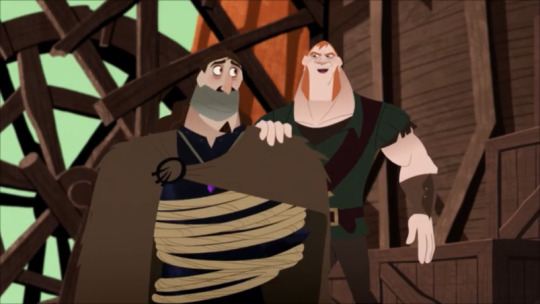
Edmund took out Adria. The Brotherhood is suppose to be the best physical fighters in this world and Edmund is supposed to be best out of all of them. Yet he’s taken out by two random, mediocre dudes who didn't even jump him. They gave him time to respond and he stood up to fight them.
Was all his physical prowess tied into that axe? Is the axe magic?
If you characters have to be depowered for unexplained reasons for the plot to work than you haven’t a good plot.
This Isn’t as Heartwarming as You Think It Is Show
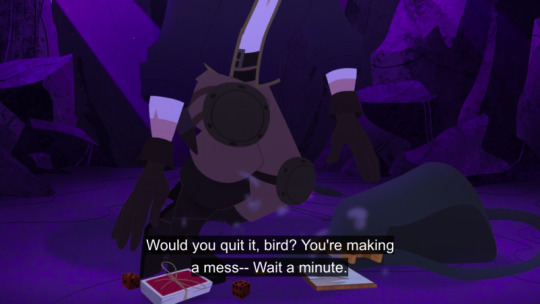
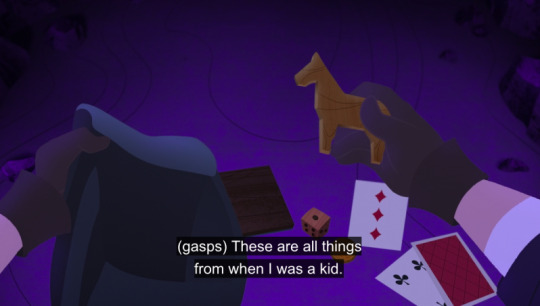

If Edmund knew where Eugene was this whole time then he could have actually provided for his son. He could have arranged adoption with someone by letter, sent money, food, clothes, ect, maybe even wrote to Eugene directly and kept up a long distance relationship to be there for him emotionally.
There is literally no excuse anymore for Edmund to hide behind. He literally neglected his duties as a parent, just cause.
Finding these things shouldn’t make Eugene happy. Finding these things should piss him off even further because that’s how any logical adult would respond to this bullcrap.
I sure know I’m angry. I’m angry that Eugene is a pawn for the creators’ writing wank-off rather then being treated as human being; as an actual character.
“Nice” Isn’t the Same Thing as Kind, Rapunzel
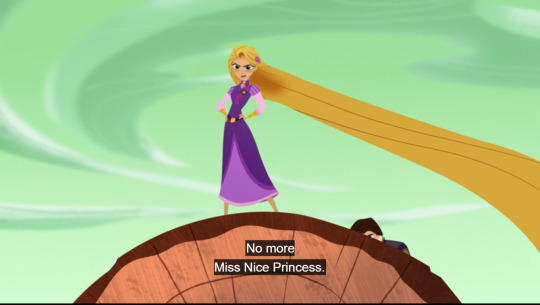

One could argue that she’s not even superficially nice in season three, but the real problem here is that the show, and by extension Rapunzel herself, doesn’t understand the difference between being “pleasant” and actually being a good person. Outwardly polite people can stab you in the back, can kill you even, and not care, as Rapunzel has demonstrated repeatedly since season one.
Do They Have to Be “Family” for Eugene to Give a Damn?
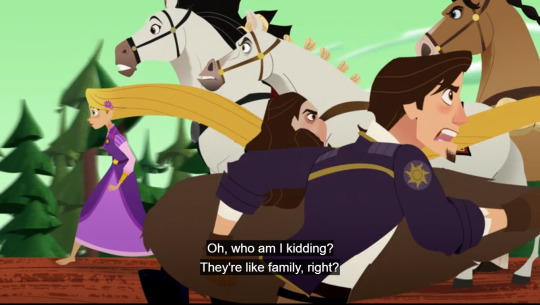
Can’t Eugene just do the right thing, because it’s the right thing to do? People don't need to be friends and family to care about each others lives. Kindness isn’t transactional. Empathy and true charity doesn’t come with strings attached. If Eugene’s whole arc is about becoming a better person, then making the Stabbingtons “family” kind of undermines this.
Don’t Reward the Dude for Doing the Bare Fucking Minimal

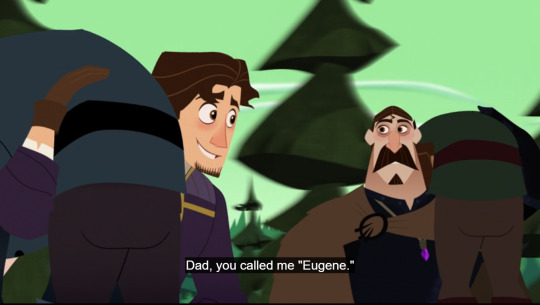
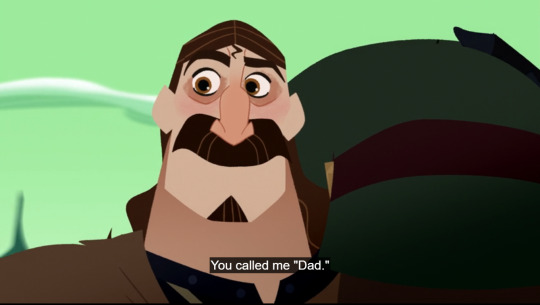
No seriously. Edmund forfeited the right to ever be called “dad” by Eugene a long fucking time ago. He doesn’t get to be called that now just because he stopped being a piece of scum and showed the bare minimal of human decency. Even if Eugene decides to have a relationship with Edmund after this, it doesn’t mean that he has to be recognized as his dad or that that relationship will be a parental one.
Eugene, and by Extension the Show, Places Rapunzel Upon a Pedestal to the Detriment of All



Only 4 villains out of 20 get redeemed in this show. Four, and yes I’m counting the Stabbintions as one entity here. That’s 16 times Rapunzel failed to give someone a second chance just cause she didn’t feel like it that day, and even here she did fuck all in trying to give the Stabbingtons any sort of chance. That was all on Eugene.
The more this show goes on, the more it looks like Eugene is just in love with the idea of Rapunzel rather than who she actually is as a person. It’s a disservice to both their characters but it damages Rapunzel most of all because the show perpetuates this over idealization to everyone she interacts with.
It’s really sickening to watch and terrifying to know that some uphold this selfish brat as a “role model” for little girls. There’s nothing empowering in being an inhuman “goddess” who can do no wrong....even as they do several wrongs and never gets called out on it.
This Isn’t “Cute”
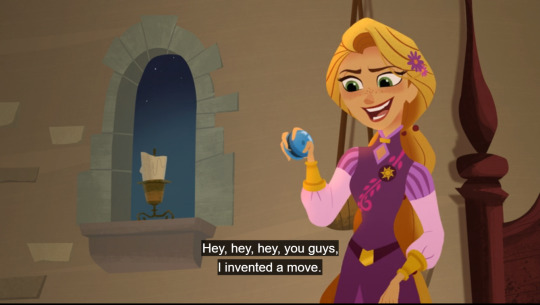
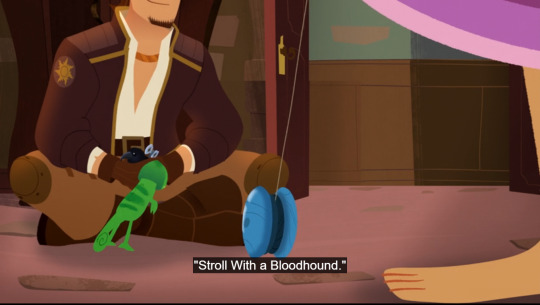
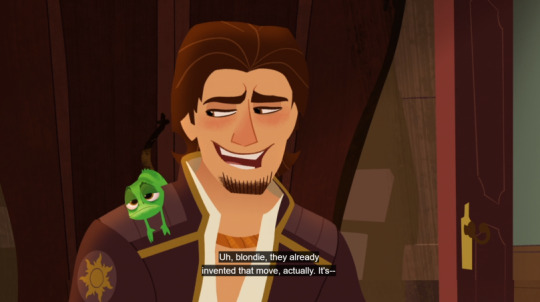


Eugene can’t even have an opinion on a fucking toy!
Look if you still like New Dream despite how horribly written it is this season, then good for you. That is completely understandable, especially since this is mainly a problem with season three and not really in the first two seasons and certainly not in the movie.
But if you try to deny that they aren’t toxic in season three, that people who do have problems with how they’re written aren’t valid in their concerns, than you’re either someone who hasn’t been paying attention or someone who has gross double standards for women in relationships.
This Scene Is A Waste of Time
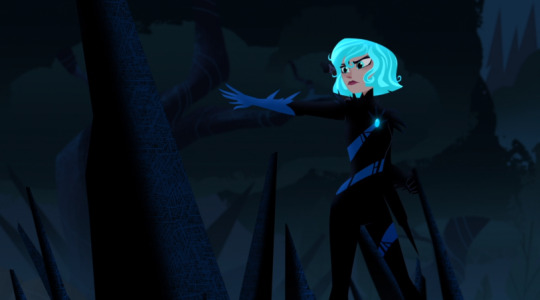
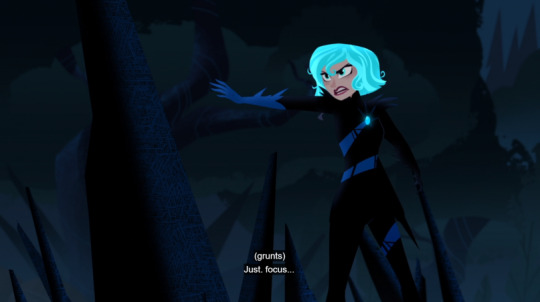


This doesn’t tell the audience anything. It contradicts what was previously established concerning her powers without explanation and then just throws the creepy girl voice in there for a lazy hook. It doesn’t work at foreshadowing since we repeat this info all over again in the next episode and it doesn’t expand upon neither Zhan Tiri’s nor Cassandra’s characters.
In fact it kind of contradicts Cassandra’s characterization in the last episode as well. Is she a remorseless bad bitch or a vulnerable woobie? She can’t be both. Not in the way show is going about it anyways.
It’s poor time management and poor storytelling.
Conclusion
It was mildly better than Rapunzel’s Return, but that’s not saying much. Everyone’s character is still circling the drain and there’s no escape line in sight.
But before I close out, here is a real world update. I had to quit my job at Amazon for personal reasons and am currently job hunting. I’m not hurting right now, I do have money saved up to cover me for at least a month and I’ve been doing commissions here and there, however despite having more time technically to write these reviews, I’m now having to juggle it along with artwork and job hunting.
If you would like to support my reviews and other personal projects you can send me a tip over at Ko-Fi and more public commissions will be opening soon over there as well.
https://ko-fi.com/rachelbethhines
94 notes
·
View notes
Text
I get why they went with "Rapunzel" being the name her parents named her in the series, but you'd think they would've made that public knowledge to their citizens, or for Gothel to bother changing it. It makes much more sense for Gothel to have given her the name because in the original story it was supposed to be insulting.
But Rapunzel is the iconic name from the story and you can't really change that without it no longer being Rapunzel you know?
I STILL THINK IT WOULD'VE BEEN A FUNNY AND INTERESTING THING TO DO.
You have Rapunzel having to live up to a Princess the Kingdom has never known, building up their own image of her and who she would be.
And then Eugene!!! Having to live up to the name he made for himself and the one he's trying to make for himself.
They both could have such paralleling arcs, reconciling with the people they were, who they are becoming, and who everyone wants them to be.
*********
You could have Rapunzel's birth name from her parents be different, but since she grew up with the name Rapunzel, she has to decide if she wants to keep it or not.
Maybe an episode where she's debating changing it because Gothel's the one who named her that, because this new name is what her parents keep calling her and she doesn't want to disappoint them. She spends the day with doubts and questions, trying to figure out who she would've been had she grown up here, had she not been Rapunzel. She tries to give up being Rapunzel for a day, tries going by this new name, tries to be this new name, this person she might have been. She spends the day doing what a Princess or what a lady of the court would do. Wears shoes, joins in on long meetings, eats expensive but bland foods, doesn't help the servants or cook or clean for herself. Paints on canvas and refrains from climbing to the roof to paint on that perfect bare spot on the ceiling that’s just calling out to her. Its different, and not what she's used to. She's not sure if its fun or not. Not sure if its her. And every time someone calls her by her royal name instead of Rapunzel... well she's not sure how to feel.
Meanwhile, Eugene would be going through something similar. He'd be out and about, probably around the city, maybe around the castle, and probably completing some form of community service. He doesn't have guards following him around to make sure he does it, and if Rapunzel had asked, he probably wouldn't even have to do it. But he wanted to. He.. doesn't know how to feel in the castle, in the capital. He wants to be with Rapunzel, and he wants to feel like he finally belongs somewhere, but his past self is making it hard for him. He needs to figure out who Eugene Fitzherbert is.
They touched on this a little during the Fitzherbert P.I. episode, Eugene tried to join the royal guards, but that was more about his place in the castle, rather than figuring out who he is now. That didn't really happen until the Flynnposter episode, but that was season 3. Where was this issue in all the previous seasons??? Has he been holding onto this for 3 years and never once said anything? Only for it to be brought up and "solved" in one episode??? Eugene???? Buddy??? You okay there???
I love the tangled series, I really do, but sometimes the tv series format really hurts their characters and arcs.
Anyway, I think it would’ve be really cool if they could have had this parallel identity issue. They try and deal with it alone. Before finding each other.
Rapunzel tries to be who everyone else thinks she is supposed to be.
Eugene tries to be the opposite.
Throughout the day, they both have to deal with the baggage each of their names throws at them. Becoming someone new, and forgetting who they were. Expectations and dismissals. Before finally something happens for them both to wonder what's the point.
Why doesn't she like her new (old? original?) name, its supposed to be hers, isn’t it?
Why bother trying to be someone new if all anyone will ever see is a thief?
Both of them are struggling, and naturally, they end up seeking each other out.
They confide in each other. And eventually, find the answers they were seeking. Encourage the other to ask what it is that they want, and finally gain the strength and the confidence to be who they want to be.
Rapunzel would decide to keep the name, Rapunzel. Its the first step to not letting Gothel control her life anymore. Rapunzel is her name. She likes her name. And she's not afraid to make it her name.
And Eugene has decided to stop worrying about what people say. He can't change who he used to be. Only try and show people who he is now, the real him.
Plus there could be some funny and cute moments where Eugene comments on them both having multiple names and making a contest of it.
And then when the name Horace comes into play, Rapunzel makes the joke that he has more names than her now, but he disagrees with her and calls her sunshine☀️
10 notes
·
View notes
Text


Please see my verse for a general overview - some things are different and I’m okay with that. Both posts are going to be referenced [ here ]
Basics
cruella
Cruella is a famous robe designer in the Wizarding World, and has made a name for herself. You can always spot Devilish Attire. Meanwhile she has a booming empire in the House of de Vil in the Muggle World. She went to Hogwarts and was a Slytherin.
Carlos taught himself his basic schooling with some help from Jasper and Horace two Squibs who Cruella employs. When Carlos begins to show signs of magic she tells him he’s a squib and wont amount to anything.
hogwarts acceptence
Carlos’ Hogwarts letter is burned, but he still sends an acceptance, he manages to write “i’ll come - Carlos de Vil” on a scratch piece of a paper, a receipt, and hands it to the owl, who brings him a second letter, one he hides from his mom by keeping it on his person at all times.
Year 1
sorting
Carlos was a near hat stall, he and the Hat had a long talk about where he was to be placed. Essentially what actually happened is that the Hat told him some of his options, and Carlos spoke for like 4:30 about why he should be put in Ravenclaw despite knowing next to nothing about it. Carlos is wearing a robe from a fellow first year who took pity on him. He isn’t wearing a uniform though instead he’s wearing his street clothes, his only possessions that he has with him. Its Incredibly embarrassing.
wand
Do to him not able to go to Diagon Alley he doesn’t have a wand. This was discovered after the feast, and on the first day of classes Olivander comes to school to aid Carlos in getting his first wand. Carlos says he can’t afford the wand, and Olivander feels for the boy’s situation and as long as Carlos promises to help him one day he can have the wand free of charge.
animals
Carlos finds a cat on the grounds of Hogwarts, he is a Persian Tuxedo Cat [ here ], who he names Beelzebub. The cat follows him around everywhere he can’t help it. He cannot take the cat home, just like he can’t take anything home because of his home situation.
mail
Carlos does not have an owl, but Cruella does have a Snowy Owl that Carlos becomes very acquainted with, even if the creature hates him. The owl is what sends Carlos his daily Howlers from Cruella.
It is a poorly kept secret that Carlos’ mom is abusive towards him, but their is literally nothing people can do. Cruella is just too powerful of a witch, and in too high of a position. But additionally people know this because of Carlos’ last name, and the fact that he should be one of the wealthiest students but is in fact the very opposite.
clothing
Carlos has one set of street clothes his first year, its what he was sorted in save for a cloak given to him by an older student who felt bad. He typically wears his uniform everywhere.
His pajamas his first year include an old Ravenclaw t-shirt given to him by the prefect who gave the first year Ravenclaw their tour. The shirt swallows Carlos up because the prefect was like 6′4.
As the years go on he gets a few clothes, all of which never leave Hogwarts because his mother would destroy them if he brought them home.
belongings
Carlos does one assignment with a quill before he switches to pencil for the rest of his time at Hogwarts. It was a simple introduction assignment ( not graded )but because of his terrible self taught handwriting, and not knowing how to use a quill and ink, that was quickly put to a stop.
Carlos comes to Hogwarts with no money, and the clothes on his much. He didn’t have much to bring, but Carlos has nothing. Most of what he has is borrowed, or given to him by a pitying upper class-men.
Carlos can’t bring anything home because it will be destroyed by Cruella, this includes his wand among other things. Due to this, Carlos actually becomes very proficient at wandless magic.
clubs
Carlos joins two main clubs while at Hogwarts, and his first reason for joining them is boredom. He’s a smart boy but without his puzzles and technology he gets bored so easily. So he joins clubs.
Carlos joins the dueling club, and absolutely loves it. He loves the fluidity of a good duel, its like a dance. He learns alot of spells this way as well.
Carlos is invited to join the Slug Club about half way through his first year. He’s the youngest member, but he has a knack for potions that Slughorn says he has never seen. This is only the beginnings of calling Carlos one of the brightest, and smartest Wizards Hogwarts has ever seen. Possibly the smartest.
other/hobbies
Over Christmas his first year he takes up Wizards chess, its fun, he can play by himself, which he typically does when his friends go to Hogsmeade. He likes the strategy of it. And aside from the moving pieces its something that he distinctly knows from the muggle world. In a world so unfamiliar, he likes learning about it, but he likes finding something familiar.
Carlos goal is to make electronics work at Hogwarts. He starts this endeavor his first year, and finally finds a conclusion at the end of his first year. Its not perfected til later. But it works, it allows electronics to emit a signal within Hogwarts so they can work, but are still masked to locations are unknown or the student’s home.
Year 2
quidditch
Carlos has a knack for flying, it was noted on his first year flying exam.
Jay convinces him to join quidditch. Carlos is hesitant at first cause he’s not a fan of how physical the game gets. But he does, even if they aren’t in the same house. Carlos makes the Ravenclaw team as their seeker.
Carlos does not have a broom of his own. He uses a school broom exclusively pushing the thing to its limits. Because he is at a disadvantage, he puts the whole team at a disadvantage its hard for Ravenclaw to ever win. He is always practicing when he has free time because he hates letting his team down. However the wins are never huge because Ravenclaw is the highest scoring team at Hogwarts because they try to make up for the snitch deficit. If another team wins its usually only by 10 or so parts.
grades
Carlos quickly becomes top of his year. His grades are unmatched.
year 3
hogsmeade
Carlos does not get permission to go to Hogsmeade. He stays at school, and gets so bored when it happens. He really notices the divide between him and the rest of the students during this time. To help cure his boredom, he collects stuff he finds around school and builds Rube Goldberg machines.
peeves
Its during a Hogsmeade weekend where one of his machines attracts the attention of Peeves. He and Peeves are friends, and he is one of the few people who Peeves will listen to. Peeves used to pull pranks on him all the time especially as a first year.
year 4
classes
Carlos likes all of his classes but some he likes a little bit more. He loves potions, and if things get rough and he starts to panic, he will name common potion ingredients that he saw on a table in his potions book, almost like the periodic table. This love also later translates into a love of alchemy.
Carlos is particularly good at charms, and later very good at wandless and wordless magic. He loves this class because he loves Professor Flitwick.
Carlos also loves transfiguration the physics of it all, and the math of it all fascinates him. He wants to become an animagus one day but cannot do it at school its too taxing of a process. But he is proficient at transfiguration.
Carlos also just likes arithmacy. Its math, and he’s good at it.
Year 5
prefect
Going into his fifth year Carlos isn’t aware that he is going to be a prefect. Its been another hard summer, and Carlos is at the platform, when one of his friends who is older, likely Evie comes up to him and hands him an envelope. She was entrusted with telling him, he is shocked.
OWLS
Carlos takes all the OWLS he can and gets not only O’s but perfect scores on all of them.
Year 6
summers
Carlos cannot bring anything home with him over the summer it will get destroyed. This is communicated to him through plenty of Howlers. He and professor Flitwick along with a few of his friends devise a plan to keep his stuff safe.
Summers are very hard on Carlos. He comes back to school in pretty bad shape. Nothing beats how he comes back when going into his second year. Cruella is not kind and lives up to her name.
Quidditch Captain
Carlos was groomed for this position from during his fifth year. He does not think he should get this position. He actually spends his entire fifth year saying he shouldn’t get it. But when he’s handed the envelope by Flitwick he can’t believe it.
Year 7
NEWTS
Carlos takes all the NEWTS he can. And like with his OWLS, not only does he get all Os but he gets perfect scores.
head boy
Carlos is the perfect candidate to be head boy He’s quidditch captain, prefect, member of two clubs, and has the best grades in the entire school. No one is more perfect. He doesn’t know until he gets to school where Hagrid hands him the envelope on the platform at Hogsmeade. He’s utterly shocked as he always when this kind of thing happens.
Since no one knows who is head boy on the train, the rumors and betting starts then.
Life After Hogwarts
apprenticeship
Carlos keeps his promise to Olivander and actually becomes his apprentice when he leaves Hogwarts. He is Olivander’s aprentice for five years. His most proud moment is the first wand he made himself. He got to see that wand sold too.
leaving cruella
Carlos doesn’t leave Cruella immediately mainly because he doesn’t have the money to. As soon as he has the money he leaves her. But until then going to work with Ollivander is hard and dangerous because of Cruella and her demands. However, it was easier because Carlos convinced her to let him work in her store doing deliveries and such. So that made it a little bit easier.
He has a tiny apartment in one of the offshoots of Diagon Alley a place that he has grown to love.
hogwarts
After his fifth year of working for Ollivander he was offered a position at Hogwarts as the potions master. He was suggested for this position by Slughorn himself, and backed by various other professors. He takes the job.
A few years later Flitwick retires, and the title for Head of Ravenclaw House is passed down to him. He rarely recalls a moment where he is happier.
17 notes
·
View notes
Text
9 Tips That Don’t Work for Weight Loss, Say Dietitians | Eat This Not That
New Post has been published on https://weightlosshtiw.com/9-tips-that-dont-work-for-weight-loss-say-dietitians-eat-this-not-that/
9 Tips That Don’t Work for Weight Loss, Say Dietitians | Eat This Not That

As a nutritionist, I’ve heard all the tips for weight loss—the good, the bad, and the totally off-the-wall. From the age-old cabbage soup diet to the more recent strategy of eating cotton balls to fill the stomach, there’s no shortage of trendy ways to shed pounds–many of them are not only strange but also potentially harmful.
Even mainstream folk wisdom about how to lose weight can sometimes steer you in the wrong direction. So what do dietitians (the real weight loss experts) have to say about which tips are solid and which make them roll their eyes? I asked several registered dietitians to get their feedback. Here are nine weight loss tips they say to skip, and for more tips on how to lose weight, be sure to check out our list of 15 Underrated Weight Loss Tips That Actually Work.
“Make eating inconvenient.”
In theory, it kind of makes sense that putting obstacles in the way of your eating—like by using chopsticks instead of a fork or eating with your non-dominant hand—could help you eat less. But it’s not exactly a practical solution to the issue of overeating.
“While you might find yourself eating slower, you can still finish a full meal,” says Carrie Gabriel, MS, RD. “It is time-consuming, and if a person is busy, that could be frustrating.”
Besides frustration, eating in awkward ways might just make you look silly. “Think of the mess a person would make if it was a food such as, say, steak or a burger, which need a hand or utensils to cut it into small pieces,” says Gabriel.
“Put on tight clothes before you eat.”
Another lifestyle change that’ll only lead to discomfort? Changing your wardrobe at mealtimes. You may have heard the tip to don tight clothing before you eat in order to stay mindful of each mouthful. But keeping up a constant awareness of your weight at mealtimes creates negative self-talk—which you definitely don’t need when you’re trying to be healthy.
“There’s nothing wrong with being motivated to realistically fit into your own clothing that you recently wore, but it’s more important to dress the body you have and focus on your plate instead of your closet,” says Bonnie Taub-Dix, RDN, creator of BetterThanDieting.com and author of Read It Before You Eat It—Taking You from Label to Table.
In the midst of a busy day, there’s a time and a place for a probiotic-rich fruit and yogurt smoothie or protein shake instead of a sit-down lunch. But opting out of all meals in favor of weight loss shakes is likely to be a mere quick fix.
“While replacing food with a shake can be effective for some, there are important points to consider,” says dietitian and personal trainer Anthony DiMarino, RD, CPT. “Meal replacement shakes are normally very low in calories and fiber and therefore do not keep people satisfied for long periods of time.”
DiMarino adds that many meal replacement shakes tend to be high in sugar, which can spike blood sugar—a major drawback if you’re living with diabetes or pre-diabetes.
Instead, make yourself one of these 100 Best No-Cook Recipes of All Time.
“Eat only one food.”
Remember the grapefruit diet? Or the potato diet? Or any diet that told you to eat just one food? Monotrophic diets—those that advise sticking to a single food or food group—have been around for ages. The idea goes that you can only eat so much of any food before getting so bored you’ll basically stop eating altogether.
It doesn’t sound like a recipe for a healthy relationship to food, says Gabriel. And it sure doesn’t sound like fun!
“This pushes a person into eating disorder territory, in my opinion,” she says.
Meanwhile, if you go too long without a varied diet, you’re more likely to end up in the hospital than in a bikini competition.
“Eating only one type of food for an extended time period will make you deficient in other nutrients your body needs. Eventually, this could result in life-threatening illnesses,” Gabriel says.
“Don’t eat carbs.”
No one can deny the weight loss-boosting effects of cutting back on carbs on a diet like keto or Atkins. But for many people, opting out of carbohydrates completely can become a too-drastic elimination—one that might not even work in the long term.
“The research suggests you will undoubtedly lose weight by cutting out an entire food group,” says DiMarino. “But at what cost? Depriving yourself from carbohydrates (your main energy source) will ultimately reduce your quality of life over time. Low carb diets can cause you to experience hunger, irritability, fatigue, mood swings, constipation, headaches, and brain fog.”
If you’re considering ditching carbs for weight loss, it’s best to talk to your doctor or dietitian before diving in—as well as to be aware of the risks.
“A low-carb diet can put you at risk for kidney stones, osteoporosis, and even gout,” DiMarino says.
“Chew each bite dozens of times.”
This one’s another throwback: Simply chew your food into a liquid pulp and watch the pounds fly off! The art of “Fletcherism” had its heyday in the early 1900s when food faddist Horace Fletcher (the early 20th-century version of an Instagram influencer) advised his adherents to chew every bite until liquefied to boost weight loss.
To this day, you’ll sometimes see this tip circling back around. And, in truth, it’s not a bad idea to chew thoroughly—but it’s no magic bullet for weight loss.
“While chewing your food multiple times before swallowing is ideal and aids in proper digestion, and eating more slowly can make you conscious of becoming fuller more quickly, this can also be time-consuming,” says Gabriel. “Depending on the food and depending on a person’s relationship with food, it can make them obsess over their food and not actually enjoy it.”
For more healthy eating tips, check out our list of 9 Best Healthy Eating Hacks for Weight Loss.
“Cut out fat.”
If there was one prevailing weight loss mantra of the 1980s and ’90s, it was that eating fat made people fat. Non-fat potato chips, salad dressings, and even (ew) ice creams became staples of “healthy” households. Now, however, research has shown that the right kinds of fats are an important part of a healthy diet—even a diet for weight loss!
“Fat is an essential nutrient that not only helps us absorb fat-soluble vitamins and essential nutrients, but it also helps us feel full and satisfied to help prevent overeating,” says Taub-Dix. “The key when trying to reduce your weight or eat healthfully in general (even if your weight is not an issue for you), is to choose the right fats.”
Monounsaturated and polyunsaturated fats are the kind to enjoy regularly in your diet. Taub-Dix recommends including plenty of nuts, avocado, and oils like avocado oil or olive oil.
“Don’t ever indulge.”
Popular weight loss advice is guilty of plenty of untruths—chief among them the idea that, when trying to reach a healthy weight, you can’t indulge in any of your favorite foods. Make one “mistake” by having a donut or pizza, goes the thinking, and you’ve done irreversible damage.
Dietitians know this is far from true.
“Why should you be denied of your favorite foods just because you’re trying to lose weight?” says Taub-Dix. “If you don’t eat any of those indulgent foods you love, there’s a good chance that you’ll wait until you’re ‘off’ your diet to enjoy them. That’s when those foods usually come back with a vengeance—in unreasonable portion sizes and too often.”
Rather than thinking of your weight loss effort as a short window of restricting the joy out of food, you’ll benefit far more in the long-term by (sometimes) including best-loved menu items.
“A weight loss plan that will be sustained should always include foods you love because, after all, this should be a diet you incorporate into your life, not a diet you change your life for temporarily,” Taub-Dix says.
“Just cut calories.”
When it comes to weight loss, we all know the basic concept of calories in versus calories out. It seems like losing weight should be so simple—yet many dieters find that just eating less somehow doesn’t budge the scale. Turns out, multiple factors are often at work in your body to complicate this equation.
“While the prevailing evidence suggests weight loss can occur as long as there is a calorie deficit, the kinds of calories do matter,” DiMarino says. “Human bodies are complex biological systems that process foods with different micronutrient makeups in completely different ways. Physiologic and hormonal changes occur in response to the foods we eat.”
If you’ve found you’re not making progress by sticking to a calorie target, don’t despair! Fortunately, you can experiment (especially with a dietitian’s guidance) with what types of foods and food combinations you consume. One possibility: work on incorporating higher-fiber, nutrient-dense foods as often as possible.
“Choosing to eat less processed, whole foods improve overall satiety (thus limiting overeating), provides steady energy all day long, and improves body composition over time,” DiMarino says.
This content was originally published here.
0 notes
Note
Well for the fanfic since you did proposal. Let's move on to the Hell's Studio Wedding, where Joey has to walk Susie down the isle, Henry is the best man, and I don't with anyone else what their roles, but it has to be the best wedding for Susie and Sammy.
Sammy and Susie’s wedding was a very private affair. Sammy didn’t have much in the way of family, and besides, they had actual living breathing cartoons attending. That had to be kept on the downlow. So only close friends and relatives were present. Susie’s family were a little…unnerved at first when they showed up and there were three living cartoons walking around as if nothing was wrong. Alice served as the maid of honor, since she and Susie were practically sisters, while Henry was Sammy’s best man. It had been decided that Joey would walk Susie down the aisle, as her father had some mobility issues. Bendy was the ringbearer since Boris wanted to be the flower girl. They’d gotten him a cute little dress and everything. Meanwhile Normal was on organ. Wally was just sort of…there. He didn’t have anything specifically to do so he just hung out and existed. A few of Susie and Sammy’s relatives struck up a conversation with him. The venue was a park a few miles from the studio. They’d set everything up so the ceremony would take place in a gazebo, with the guests sitting in folding chairs. A church had been out of the question, given what had happened last time Bendy had been in one. Neither Susie nor Sammy had minded, despite how much Sammy had complained about the bugs.
“I still can’t believe this is happening.” Sammy muttered as he adjusted his bowtie for the millionth time.
“Stop fiddling with it, Sammy.” Bendy said. “Everything’s gonna be fine!”
“He’s right. You need to stop worrying.” Henry said, putting a hand on Sammy’s shoulder. “I made sure Joey didn’t do anything weird.” He whispered, soft enough that Joey couldn’t hear him. “I checked the whole place out.”
“Thanks.” The corners of Sammy’s mouth twitched up. He could always count on Henry to make sure things went smoothly.
“No problem.” Henry said. “This is important.”
“What are you two whispering about?” Joey asked, sidling a bit closer.
“Nothing.” Sammy said quickly.
“Hey, where’s Boris?” Bendy suddenly asked, trying to get attention away from the hushed conversation. The trick worked and Joey’s attention was immediately drawn elsewhere.
“I think he went out to find some flowers to throw.” Joey looked back to the entrance of the tent they’d set up. “He said something about fresh flowers?”
“Just hope no one has an allergic reaction.” Sammy muttered.
“Hopefully not.” Henry said.
“I found flowers!” Boris reentered the tent, holding a basket of dandelions and tulips.
“Where’d you get those?” Bendy asked.
“I picked ‘em!” Boris said brightly. “Now I can toss the flowers!”
“Nice job, big guy.” Henry said, patting the wolf’s back. “Now, we should probably get moving. The ceremony’ll start soon. Don’t want to miss your own wedding, do you, Sammy?”
“Susie’d kill me.” Sammy couldn’t help but smile.
“Well, let’s get going then!” Joey headed for the gazebo. “I just hope I won’t cry too much. Wouldn’t want to embarrass you two too much.”
“We all know you’re going to bawl like a baby.” Sammy said. “We wouldn’t have it any other way, though.”
And with that, they made their way to the gazebo, where the minister was waiting. The guests were waiting. Sammy’s mother, normally a very composed woman, dabbed at her eyes with a handkerchief. Sammy started fiddling with his bowtie again. This was happening. It was really happening. He almost couldn’t believe it. He turned his gaze back to the aisle. Bendy and Boris stood together, ready to do their duties. Catching Sammy’s eye, Bendy gave the music director an enthusiastic thumbs up. Then Susie arrived. Susie was a modest person, so she’d chosen a dress that was simple, not too frilly. It suited her quite well, and to Sammy she was the most beautiful woman in the world. Alice walked directly behind her, holding some of the flowers Boris had picked. Joey was at her arm, dabbing at his eyes as he began to walk Susie down the aisle. Boris sprung into action, walking in front of the bridal procession, throwing flowers and happily doing his job.
“Nice job.” Henry whispered to Boris as the wolf passed. Susie, Alice, and Joey reached the gazebo and took their places. Joey scrambled back to his seat in the front row beside Wally. With everyone there, the minister cleared his throat and began. Normally, Sammy wasn’t a terribly religious person, but for Susie, he was willing to make an exception. Not to mention his mother had wanted a Christian wedding as well. He just stared into Susie’s eyes as the minister spoke. The prospect of spending the rest of his life with her honestly excited him. She was one of the best friends he’d ever had and he loved her more than he could possibly put into words. They’d discussed whether or not they’d change their names and decided against it since they were both so fiercely independent. Soon enough, the time came to exchange vows. Bendy proudly presented the rings, winking at both Sammy and Susie.
“Do you, Samuel Horace Lawrence, take Susie Alice Campbell to be your lawfully wedded wife?” The minister asked. Sammy took a deep breath and slipped the ring onto Susie’s finger.
“I do.”
“And do you, Susie Alice Campbell-”
“Of course I do.” Susie interrupted the minister, putting her own ring on Sammy’s finger. Sammy tried not to laugh at this. That would be rude, and his mother was watching. God he loved her. Alice had to cover her mouth to keep from laughing. The minister frowned, but quickly regained his composure.
“Very well. I pronounce you husband and wife.” He said. “You may kiss the bride.” Even after all these years, Sammy still got a little nervous when it came to kissing Susie. He leaned forward, preparing himself. Susie then proceeded to grab his head and plant one on him. There was a whoop from the guests as Susie’s sister stood up and cheered her on. This time Sammy laughed.
“Way to take the initiative.” He said when she pulled away.
“Well you weren’t going to do it.” She said with a little half smile.
“Alright!” Bendy grinned and applauded them. “Now, who wants cake?’
“I do!” Boris raised his hand, tail wagging. Bendy didn’t have the heart to tell him it had been a rhetorical question. The group made their way to the tent where the catering had been set up. Henry’s wife, Bella, had put herself in charge of the food. No one really trusted Joey to not sneak ink into the food. Henry’s kids went straight for the cake, jumping and begging for a slice.
“Hang on.” Henry said. “The couple’s got to cut the cake.” Susie and Sammy were the last to enter, walking arm in arm. Sammy was making a joke about how he’d half expected Bendy to pull some kind of prank on him. Susie agreed, adding that she was glad he hadn’t. She would have had to get a little…physical if he had.
“Reminds me of when we got married.” Bella said, leaning on Henry as the newlyweds made their way to the cake. “Although, we didn’t have living cartoons in attendance then.”
“It’s certainly interesting.” Henry agreed.
“Alright, settle down.” Sammy said as the kids clambered for the cake. “You’ll get your piece.” The cake was chocolate, Susie and Sammy’s favorite. Together, they cut the cake and began dishing it up. Henry’s children got the first few slices, then the toons got some, and finally the adults. Sammy stood back and watched everyone. How had he gotten to this point in his life? Sammy had honestly never expected to get married. He’d never expected to have such good friends or be part of something like Joey Drew Studios. It wasn’t what he’d expected from his life, but it was so much better than anything he could have ever predicted. Beside him, Susie squeezed his hand.
“I’m glad I met you.” She whispered.
“Yeah. Me too.” He said, leaning his head against hers. He could hear Henry yelling from somewhere to his left, trying to get Joey to stop doing something. Probably black magic. Bendy was running over, handing his cake off to Boris. Sammy smiled to himself. This…This was alright.
#bendy and the ink machine#hell's studio au#sammy lawrence#susie campbell#henry#joey drew#boris the wolf#bendy the dancing demon#fanfiction
41 notes
·
View notes
Photo


Please see my verse for a general overview - some things are different and I’m okay with that. Both posts are going to be referenced [ here ]
Basics
cruella
Cruella changes her last name to de Vil post graduating Hogwarts where she was a Slytherin. At school she got the nickname Cruella, but was more commonly known as Ella Avery, a member of one of the Sacred 28 families. She was close with another pure blood Edgar Bulstrode ( Edgar Balthazar in descendants ), whom she would later have relations with, he was Carlos’ father.
Cruella became a famous robe designer in the Wizarding World, and has made a name for herself. You can always spot Devilish Attire. Meanwhile she has a booming empire in the House of de Vil in the Muggle World.
Carlos taught himself his basic schooling with some help from Jasper and Horace two Squibs who Cruella employs. When Carlos begins to show signs of magic she tells him he’s a squib and wont amount to anything.
hogwarts acceptence
Carlos’ Hogwarts letter is burned, but he still sends an acceptance, he manages to write “i’ll come - Carlos de Vil” on a scratch piece of a paper, a receipt, and hands it to the owl, who brings him a second letter, one he hides from his mom by keeping it on his person at all times.
Year 1
sorting
Carlos was a near hat stall, he and the Hat had a long talk about where he was to be placed. Essentially what actually happened is that the Hat told him some of his options, and Carlos spoke for like 4:30 about why he should be put in Ravenclaw despite knowing next to nothing about it. Carlos is wearing a robe from a fellow first year who took pity on him. He isn’t wearing a uniform though instead he’s wearing his street clothes, his only possessions that he has with him. Its Incredibly embarrassing.
wand
Do to him not able to go to Diagon Alley he doesn’t have a wand. This was discovered after the feast, and on the first day of classes Olivander comes to school to aid Carlos in getting his first wand. Carlos says he can’t afford the wand, and Olivander feels for the boy’s situation and as long as Carlos promises to help him one day he can have the wand free of charge.
animals
Carlos finds a cat on the grounds of Hogwarts, he is a Persian Tuxedo Cat [ here ], who he names Beelzebub. The cat follows him around everywhere he can’t help it. He cannot take the cat home, just like he can’t take anything home because of his home situation.
mail
Carlos does not have an owl, but Cruella does have a Snowy Owl that Carlos becomes very acquainted with, even if the creature hates him. The owl is what sends Carlos his daily Howlers from Cruella.
It is a poorly kept secret that Carlos’ mom is abusive towards him, but their is literally nothing people can do. Cruella is just too powerful of a witch, and in too high of a position. But additionally people know this because of Carlos’ last name, and the fact that he should be one of the wealthiest students but is in fact the very opposite.
clothing
Carlos has one set of street clothes his first year, its what he was sorted in save for a cloak given to him by an older student who felt bad. He typically wears his uniform everywhere.
His pajamas his first year include an old Ravenclaw t-shirt given to him by the prefect who gave the first year Ravenclaw their tour. The shirt swallows Carlos up because the prefect was like 6′4.
As the years go on he gets a few clothes, all of which never leave Hogwarts because his mother would destroy them if he brought them home.
belongings
Carlos does one assignment with a quill before he switches to pencil for the rest of his time at Hogwarts. It was a simple introduction assignment ( not graded )but because of his terrible self taught handwriting, and not knowing how to use a quill and ink, that was quickly put to a stop.
Carlos comes to Hogwarts with no money, and the clothes on his much. He didn’t have much to bring, but Carlos has nothing. Most of what he has is borrowed, or given to him by a pitying upper class-men.
Carlos can’t bring anything home because it will be destroyed by Cruella, this includes his wand among other things. Due to this, Carlos actually becomes very proficient at wandless magic.
clubs
Carlos joins two main clubs while at Hogwarts, and his first reason for joining them is boredom. He’s a smart boy but without his puzzles and technology he gets bored so easily. So he joins clubs.
Carlos joins the dueling club, and absolutely loves it. He loves the fluidity of a good duel, its like a dance. He learns alot of spells this way as well.
Carlos is invited to join the Slug Club about half way through his first year. He’s the youngest member, but he has a knack for potions that Slughorn says he has never seen. This is only the beginnings of calling Carlos one of the brightest, and smartest Wizards Hogwarts has ever seen. Possibly the smartest.
other/hobbies
Over Christmas his first year he takes up Wizards chess, its fun, he can play by himself, which he typically does when his friends go to Hogsmeade. He likes the strategy of it. And aside from the moving pieces its something that he distinctly knows from the muggle world. In a world so unfamiliar, he likes learning about it, but he likes finding something familiar.
Carlos goal is to make electronics work at Hogwarts. He starts this endeavor his first year, and finally finds a conclusion at the end of his first year. Its not perfected til later. But it works, it allows electronics to emit a signal within Hogwarts so they can work, but are still masked to locations are unknown or the student’s home.
Year 2
quidditch
Carlos has a knack for flying, it was noted on his first year flying exam.
Jay convinces him to join quidditch. Carlos is hesitant at first cause he’s not a fan of how physical the game gets. But he does, even if they aren’t in the same house. Carlos makes the Ravenclaw team as their seeker.
Carlos does not have a broom of his own. He uses a school broom exclusively pushing the thing to its limits. Because he is at a disadvantage, he puts the whole team at a disadvantage its hard for Ravenclaw to ever win. He is always practicing when he has free time because he hates letting his team down. However the wins are never huge because Ravenclaw is the highest scoring team at Hogwarts because they try to make up for the snitch deficit. If another team wins its usually only by 10 or so parts.
grades
Carlos quickly becomes top of his year. His grades are unmatched.
year 3
hogsmeade
Carlos does not get permission to go to Hogsmeade. He stays at school, and gets so bored when it happens. He really notices the divide between him and the rest of the students during this time. To help cure his boredom, he collects stuff he finds around school and builds Rube Goldberg machines.
peeves
Its during a Hogsmeade weekend where one of his machines attracts the attention of Peeves. He and Peeves are friends, and he is one of the few people who Peeves will listen to. Peeves used to pull pranks on him all the time especially as a first year.
year 4
classes
Carlos likes all of his classes but some he likes a little bit more. He loves potions, and if things get rough and he starts to panic, he will name common potion ingredients that he saw on a table in his potions book, almost like the periodic table. This love also later translates into a love of alchemy.
Carlos is particularly good at charms, and later very good at wandless and wordless magic. He loves this class because he loves Professor Flitwick.
Carlos also loves transfiguration the physics of it all, and the math of it all fascinates him. He wants to become an animagus one day but cannot do it at school its too taxing of a process. But he is proficient at transfiguration.
Carlos also just likes arithmacy. Its math, and he’s good at it.
Year 5
prefect
Going into his fifth year Carlos isn’t aware that he is going to be a prefect. Its been another hard summer, and Carlos is at the platform, when one of his friends who is older, likely Evie comes up to him and hands him an envelope. She was entrusted with telling him, he is shocked.
OWLS
Carlos takes all the OWLS he can and gets not only O’s but perfect scores on all of them.
Year 6
summers
Carlos cannot bring anything home with him over the summer it will get destroyed. This is communicated to him through plenty of Howlers. He and professor Flitwick along with a few of his friends devise a plan to keep his stuff safe.
Summers are very hard on Carlos. He comes back to school in pretty bad shape. Nothing beats how he comes back when going into his second year. Cruella is not kind and lives up to her name.
Quidditch Captain
Carlos was groomed for this position from during his fifth year. He does not think he should get this position. He actually spends his entire fifth year saying he shouldn’t get it. But when he’s handed the envelope by Flitwick he can’t believe it.
Year 7
NEWTS
Carlos takes all the NEWTS he can. And like with his OWLS, not only does he get all Os but he gets perfect scores.
head boy
Carlos is the perfect candidate to be head boy He’s quidditch captain, prefect, member of two clubs, and has the best grades in the entire school. No one is more perfect. He doesn’t know until he gets to school where Hagrid hands him the envelope on the platform at Hogsmeade. He’s utterly shocked as he always when this kind of thing happens.
Since no one knows who is head boy on the train, the rumors and betting starts then.
Life After Hogwarts
apprenticeship
Carlos keeps his promise to Olivander and actually becomes his apprentice when he leaves Hogwarts. He is Olivander’s aprentice for five years. His most proud moment is the first wand he made himself. He got to see that wand sold too.
leaving cruella
Carlos doesn’t leave Cruella immediately mainly because he doesn’t have the money to. As soon as he has the money he leaves her. But until then going to work with Ollivander is hard and dangerous because of Cruella and her demands. However, it was easier because Carlos convinced her to let him work in her store doing deliveries and such. So that made it a little bit easier.
He has a tiny apartment in one of the offshoots of Diagon Alley a place that he has grown to love.
hogwarts
After his fifth year of working for Ollivander he was offered a position at Hogwarts as the potions master. He was suggested for this position by Slughorn himself, and backed by various other professors. He takes the job.
A few years later Flitwick retires, and the title for Head of Ravenclaw House is passed down to him. He rarely recalls a moment where he is happier.
#headcanon: a smart little boy#queue: quadium uranium europium etherium#verse info#verse: hogwarts : caw caw motherfuckers#verse hub: gotta get back to hogwarts
0 notes
Text
Day 166/365 - 101 Dalmatians
By Dodie Smith, Bill Peet and George Bruns
Songwriter Roger Radcliffe lives in a bachelor flat in London, along with his Dalmatian, Pongo. Bored with bachelor life, Pongo decides to find a wife for Roger and a mate for himself. While watching various female dog-human pairs out the window, he spots the perfect one, a woman named Anita and her female Dalmatian, Perdita. He quickly gets Roger out of the house and drags him through the park to arrange a meeting. He and Anita fall in love and get married.[5]
Later, Perdita gives birth to a litter of fifteen puppies. That same night, they are visited by Cruella De Vil, a wealthy former schoolmate of Anita's. She offers to buy the entire litter, but Roger says they are not for sale. A few weeks later, she hires her henchmen, Jasper and Horace, to steal them. When Scotland Yard is unable to find them, Pongo and Perdita use the "Twilight bark", a canine gossip line, to ask for help from the other dogs in London.
Colonel, an old sheepdog, along with his compatriots Captain, a gray horse, and Sergeant Tibbs, a tabby cat, find the puppies in a place called Hell Hall (Cruella's abandoned and dilapidated family estate, also known as The De Vil Place), along with many other Dalmatian puppies that she had bought from various dog stores. When Tibbs learns they are going to be made into dog-skin fur coats, Colonel quickly sends word back to London. Upon receiving the message, Pongo and Perdita leave town to retrieve their puppies. Winter has come, and they have to cross the Stour River which is running fast and laden with slabs of broken ice. Meanwhile, Tibbs overhears Cruella ordering Jasper and Horace to kill the puppies that night out of fear the police will soon find them. In response, Tibbs attempts to rescue them while Jasper and Horace are preoccupied watching television, but they finish their show and come for them before he can get them out of the house. Pongo and Perdita break in and confront Jasper and Horace just as they are about to kill the puppies. While the adult dogs attack them, Colonel and Tibbs guide the puppies from the house.
After a happy reunion with their own puppies, Pongo and Perdita realize there are dozens of others with them, 99 altogether including their own. Shocked at Cruella's plans, they decide to adopt all of them, certain that Roger and Anita would never reject them. They begin making their way back to London through deep snow; all open water is frozen solid. Other animals help them along the way. Cruella, Jasper, and Horace chase them. In one town, they cover themselves with soot so they appear to be labrador retrievers, then pile inside a moving van bound for London. As it is leaving, melting snow clears off the soot and Cruella sees them. In a rage, she follows the van in her car and rams it, but Jasper and Horace, who try to cut it off from above, end up crashing into her. Both vehicles are smashed to smithereens and fall into a deep ravine; and battered, bruised and stranded, Cruella and her henchmen are defeated at last. Cruella yells in frustration as the van drives away but Jasper finally gets the courage to tell her to shut up.
Back in London, Roger and Anita are attempting to celebrate Christmas and his first big hit, a song about Cruella, but they miss their canine friends. Suddenly, barking is heard outside and, after their nanny opens the door, the house is filled with dogs. After wiping away the rest of the soot, they are delighted to realize their companions have returned home. After counting 84 extra puppies, they decide to use the money from the song to buy a large house in the country so they can keep all 101 Dalmatians.
Favourite Song: Cruella De Vil (no doubt about it!)
Favourite Character: Roger Radcliffe
I love how funny he is, especially during his performance of “Cruella De Vil” with all the faces he makes

#dodie smith#bill peet#george bruns#walt disney#disney#ayearofmusicals#a year of musicals#music criticism#musical theatre#musical#musicals#101 dalmatians
2 notes
·
View notes
Text
Many talk about ‘love’. If they only knew that love is a person; and WHOM this person is that love speaks of...
This is evidently not love for neighbor that offers itself hoping for a return (selfish). It is not self-interest love, offered out of a desire for release from the wheel of suffering (eastern religion) or for “heaven” or some such ulterior thing (works righteousness). It is not the kind of love that the ancient Roman poet Horace commends when he advises,“‘Tis your own safety that’s at stake, when your neighbor’s wall is in flames, and fires neglected are wont to gather strength.” {And it definitely is not the selfish ‘erotic’ desires and practices of a fallen humanity.}
What we see commended in the New Testament Gospels is, rather, self-giving, other focused love, which loves just because love is good. What is commended is love that knows that it is right to care about your neighbor’s house regardless of whether your own safety is at stake, and even if it is positively dangerous to help him.
“‘You have heard that it was said, “You shall love your neighbour and hate your enemy.” But I say to you, Love your enemies and pray for those who persecute you, so that you may be children of your Father in heaven; for he makes his sun rise on the evil and on the good, and sends rain on the righteous and on the unrighteous. For if you love those who love you, what reward do you have? Do not even the tax-collectors do the same? And if you greet only your brothers and sisters, what more are you doing than others? Do not even the Gentiles do the same? Be perfect, therefore, as your heavenly Father is perfect.” - Matthew 5
However, Jesus did not just teach that people should love their fellow human beings in this openhearted and nonpartisan manner... He treated everyone he met as an image bearer of God.
Women were his neighbors, for example, even though one ancient Jewish text says, “He that talks much with women brings evil upon himself and neglects the study of the Law and at last will inherit Gehenna [hell].”
“Now when Jesus learned that the Pharisees had heard, ‘Jesus is making and baptizing more disciples than John’— although it was not Jesus himself but his disciples who baptized— he left Judea and started back to Galilee. But he had to go through Samaria. So he came to a Samaritan city called Sychar, near the plot of ground that Jacob had given to his son Joseph. Jacob’s well was there, and Jesus, tired out by his journey, was sitting by the well. It was about noon.
A Samaritan woman came to draw water, and Jesus said to her, ‘Give me a drink’. (His disciples had gone to the city to buy food.) The Samaritan woman said to him, ‘How is it that you, a Jew, ask a drink of me, a woman of Samaria?’ (Jews do not share things in common with Samaritans.) Jesus answered her, ‘If you knew the gift of God, and who it is that is saying to you, “Give me a drink”, you would have asked him, and he would have given you living water.’ The woman said to him, ‘Sir, you have no bucket, and the well is deep. Where do you get that living water? Are you greater than our ancestor Jacob, who gave us the well, and with his sons and his flocks drank from it?’ Jesus said to her, ‘Everyone who drinks of this water will be thirsty again, but those who drink of the water that I will give them will never be thirsty. The water that I will give will become in them a spring of water gushing up to eternal life.’ The woman said to him, ‘Sir, give me this water, so that I may never be thirsty or have to keep coming here to draw water.’
Jesus said to her, ‘Go, call your husband, and come back.’ The woman answered him, ‘I have no husband.’ Jesus said to her, ‘You are right in saying, “I have no husband”; for you have had five husbands, and the one you have now is not your husband. What you have said is true!’ The woman said to him, ‘Sir, I see that you are a prophet. Our ancestors worshipped on this mountain, but you say that the place where people must worship is in Jerusalem.’ Jesus said to her, ‘Woman, believe me, the hour is coming when you will worship the Father neither on this mountain nor in Jerusalem. You worship what you do not know; we worship what we know, for salvation is from the Jews. But the hour is coming, and is now here, when the true worshippers will worship the Father in spirit and truth, for the Father seeks such as these to worship him. God is spirit, and those who worship him must worship in spirit and truth.’ The woman said to him, ‘I know that Messiah is coming’ (who is called Christ). ‘When he comes, he will proclaim all things to us.’ Jesus said to her, ‘I am he, the one who is speaking to you.’
Just then his disciples came. They were astonished that he was speaking with a woman, but no one said, ‘What do you want?’ or, ‘Why are you speaking with her?’ Then the woman left her water-jar and went back to the city. She said to the people, ‘Come and see a man who told me everything I have ever done! He cannot be the Messiah, can he?’ They left the city and were on their way to him.
Meanwhile the disciples were urging him, ‘Rabbi, eat something.’ But he said to them, ‘I have food to eat that you do not know about.’ So the disciples said to one another, ‘Surely no one has brought him something to eat?’ Jesus said to them, ‘My food is to do the will of him who sent me and to complete his work. Do you not say, “Four months more, then comes the harvest”? But I tell you, look around you, and see how the fields are ripe for harvesting. The reaper is already receiving wages and is gathering fruit for eternal life, so that sower and reaper may rejoice together. For here the saying holds true, “One sows and another reaps.” I sent you to reap that for which you did not labour. Others have laboured, and you have entered into their labour.’
Many Samaritans from that city believed in him because of the woman’s testimony, ‘He told me everything I have ever done.’ So when the Samaritans came to him, they asked him to stay with them; and he stayed there for two days. And many more believed because of his word. They said to the woman, ‘It is no longer because of what you said that we believe, for we have heard for ourselves, and we know that this is truly the Saviour of the world.” - John 4
So were tax collectors, even though to stay in such a person’s home was essentially to share in his sin.
“He entered Jericho and was passing through it. A man was there named Zacchaeus; he was a chief tax-collector and was rich. He was trying to see who Jesus was, but on account of the crowd he could not, because he was short in stature. So he ran ahead and climbed a sycomore tree to see him, because he was going to pass that way. When Jesus came to the place, he looked up and said to him, ‘Zacchaeus, hurry and come down; for I must stay at your house today.’ So he hurried down and was happy to welcome him. All who saw it began to grumble and said, ‘He has gone to be the guest of one who is a sinner.’ Zacchaeus stood there and said to the Lord, ‘Look, half of my possessions, Lord, I will give to the poor; and if I have defrauded anyone of anything, I will pay back four times as much.’ Then Jesus said to him, ‘Today salvation has come to this house, because he too is a son of Abraham. For the Son of Man came to seek out and to save the lost.’” - Luke 19
The ritually unclean lepers and the social outcasts in general, often described in Bible translations as “sinners,” were also his neighbors.
“Once, when he was in one of the cities, there was a man covered with leprosy. When he saw Jesus, he bowed with his face to the ground and begged him, ‘Lord, if you choose, you can make me clean.’ Then Jesus stretched out his hand, touched him, and said, ‘I do choose. Be made clean.’ Immediately the leprosy left him. And he ordered him to tell no one. ‘Go’, he said, ‘and show yourself to the priest, and, as Moses commanded, make an offering for your cleansing, for a testimony to them.’ But now more than ever the word about Jesus spread abroad; many crowds would gather to hear him and to be cured of their diseases. But he would withdraw to deserted places and pray.“ - Luke 5
The entire life of Jesus Christ is remembered in the Gospels as a period of “gracious activity, directed especially to the sinful and despised people in Israel and even to gentiles,” which “aroused suspicion and downright opposition from the Pharisees and their scribes.”
Jesus is also remembered as loving these and other enemies and eventually as laying down his life for them.
“One of the criminals who were hanged there kept deriding him and saying, ‘Are you not the Messiah? Save yourself and us!’ But the other rebuked him, saying, ‘Do you not fear God, since you are under the same sentence of condemnation? And we indeed have been condemned justly, for we are getting what we deserve for our deeds, but this man has done nothing wrong.’ Then he said, ‘Jesus, remember me when you come into your kingdom.’ He replied, ‘Truly I tell you, today you will be with me in Paradise.’” - Luke 23
God , who promises in Genesis 4 to be his enemy Cain’s avenger of blood and puts a mark on him so that no one will kill him , becomes in the New Testament the God who himself lays down his life for his enemy out of love for him.
“This is My commandment, that you love one another as I loved you. Greater love has no one than this, that he lay down his life for his friends... - John 15
Seriously Dangerous Religion: What the Old Testament Really Says and Why It Matters by Iain W. Provan
#Seriously Dangerous Religion: What the Old Testament Really Says and Why It Matters#jesus christ#iain provan#love#christianity#scripture#tax collectors#women#lepers#gospel#horace#poet
1 note
·
View note
Text
Pauline: Halt yes, I'm looking at you. Begin a war AFTER breakfast.
Meanwhile Horace just trying to live his life.
10 notes
·
View notes
Text
Jimmy Clements, a Wuradjuri man from down Gundagai way, walked all the way up to Canberra on hearing that the Duke and Duchess of York were set to open the new federal parliament.
It was May 1927, and Jimmy was pretty well known around the Limestone Plains, the natural amphitheatre on which the new federation’s national capital had been imposed. Like other Aboriginal men whom the whitefellas regarded as amenable, harmless or both, he wore a copper breastplate around his neck bearing the name ‘King Billy’. Supposedly symbolising the white man’s respect for the blacks, the breastplate was little more than another testimony to the Indigenous man’s subjugation to the invader.
With his bare feet, wild hair and his dusty, patched-up clobber, old Jimmy was a sight the police thought best kept from the royals. But when they shooed him away some of the locals protested. Jimmy won his way. He met George and Elizabeth. Then he shuffled off with his mate John Noble.
For decades explorers, anthropologists, historians and newspaper writers claimed that the blacks of the Limestone Plains were extinct—killed by disease and grog, by settlers, police and soldiers. OnYong, the last chief of the local tribe, the Ngambri, in which Canberra’s etymology is cradled, died in an inter-tribal clash in about 1850.
He was buried ceremonially in an upright sitting position. But soon afterwards the settlers dug him up, stole his cranium and fashioned it into an ashtray. I’m pretty sure I know who still has OnYong’s skull. But that bloke never returns my calls. That’s another story, really—and a digression from how blackfellas were viewed around the national capital when the parliament first opened. Which is to say they were pretty well thought of as non-existent—gone. Frederick Watson, in his A Brief History of Canberra (published in 1927 to coincide with the opening of the new interim Australian Parliament) wrote that ‘virtually nothing’ remained to indicate the ‘former existence’ of the original inhabitants. In Canberra, even ahead of elsewhere, they seemed to wish the disappearance complete.
Jimmy Clements died a few months after winning his wish to meet and welcome the royals to Canberra. They buried him on the furthest border of Queanbeyan Cemetery, for a black man could not, even less than 90 years ago, be put to rest in consecrated ground. And there he was forgotten.
Alf Stafford with the prime minister’s car, ‘C 1’. He worked for 11 Australian prime ministers and was a confidant to one in particular, Robert Menzies. (picture: AIATSIS Collection, courtesy Michelle Flynn.)
Australia’s new federated democracy was the toast of the world for its progressiveness on minimum wages and working conditions, women’s suffrage and social security. But make no mistake, this was a country for the man of European extraction and Canberra was the capital intended to serve and strengthen White Australia.
And it was the town to which, just a few years later in 1930, a 24-year-old ex-soldier and talented cricketer, Alfred (Alf) George Stafford, arrived. A Gamilaroi and Darug man, born one of 12 children in Binnaway, New South Wales, he came to visit a friend briefly after being discharged from the Australian Army. He stayed forever after finding a job and subsequently opening a billiard parlour in Kingston, where he hosted the later world billiards champion, Horace Lindrum.
In 1937 he joined the Commonwealth Transport Department as one of its earliest ‘transport officers’—early bureaucratese for public service drivers. Over 35 years until his retirement in 1972, Stafford drove countless politicians, among them opposition leaders and 11 prime ministers, including Joe Lyons, Earle Page, Arthur Fadden, John Curtin, Frank Forde, Billy Hughes, Arthur Calwell, Ben Chifley, Robert Menzies (during two stints as PM), Harold Holt, John McEwen, John Gorton, Billy McMahon and Gough Whitlam.
Stafford first drove Menzies—whom he always referred to as ‘Sir Robert’—in 1939, during the brief, deeply flawed first prime ministership of the Liberal Party founder. And while this Aboriginal man from the bush was evidently fond of most of those he drove or otherwise worked for, it was to the waspish Menzies that Stafford, perhaps improbably to outsiders, became closest.
During Menzies’ 16-year postwar tenure Stafford, the former first-grade cricketer or St George and the Australian Capital Territory, served as adviser for the selection of the Prime Minister’s XI, beginning with the match against the West Indies in 1951. It was a duty for which Stafford, a left-handed batsman and leg-break bowler, was eminently qualified; in the 1920s he opened the batting for St George’s first XI. At number three was Donald Bradman with whom, it seems, Stafford had a relationship that is perhaps best described as ambivalent.
The Menzies–Stafford relationship extended well beyond cricket, however. The two were lifelong friends and confidants. When Stafford’s first wife Edith became ill with cancer in the early 1950s, Menzies—perhaps at the insistence of his wife, Dame Pattie, determined that driving the PM was keeping ‘Alf’ away from his increasingly onerous family responsibilities. So Menzies insisted that a job be fashioned for Stafford as a ‘Cabinet officer’. This was effectively a position as a personal assistant to the prime minister, a messenger for ministers stuck in meetings and their butler, who’d make the tea and pour the drinks when Cabinet rose.
All the while, after the death of Edith in 1954, Stafford and his two youngest children, David and Diana, periodically lived in the Lodge. They did so at the insistence of the Menzies, so that Alf, with the help of one of the housekeepers, could better support his children as a sole parent. For the Menzies, who travelled on official business often, there was the added advantage that the Staffords could serve as caretakers at the Lodge while they were away. In 1956 Alf Stafford married another of the Menzies’ housekeepers, Heather Nesbitt. The Menzies threw a wedding reception for the couple at the Lodge.
Journalists, it is said, write the first drafts of history. This may be true, notwithstanding the compromises that pre-eminent speed of delivery imposes on accuracy. Academic historians, meanwhile, warily draw clues from these first drafts then rake the archives for other, often more reliable, documentary ‘fact’. Others, like Stafford, will incidentally find themselves in the front row—or the driver’s seat—as history unfolds all around them.
Stafford sat metres from Menzies, both in the car and in the prime minister’s office, during a time of postwar stability, prosperity and social change. He was there as Menzies (with too much help from Labor’s leader, Herb Evatt) fomented anti-communist hysteria, then as Australia began fighting the ultimately divisive Vietnam War. The growth of Australian industry and burgeoning middle-class satisfaction throughout the 1950s and into the 1960s coincided with the advent of the Indigenous rights movement that led to the successful 1967 referendum, which gave the federal parliament the power to make laws for Aboriginal and Torres Strait Islander people.
Given that Stafford’s service to prime ministers from Lyons to Whitlam points to a largely hitherto unrecognised Indigenous presence at the epicentre of Australian federal political life for a significant proportion of the twentieth century, it’s reasonable to ponder whether he used his influence to try to further the lot of Indigenous Australians. But even among his own family Stafford exercised great discretion, so we may never know.
The Menzies’ daughter, Heather Henderson—who recalls Alf well—has apparently told Stafford’s children that it had not occurred to her that this confidant to her father was Indigenous.
Stafford’s extensive personal archive—including photographs of him with (and signed by) various prime ministers, personal and official correspondence, voice recordings and ephemera—is now held at the Australian Institute of Aboriginal and Torres Strait Islander Studies. Stafford’s granddaughter, Michelle Flynn, the custodian of this archive, gave the collection to the institute in 2014.
The institute’s director of collections, Lyndall Osborne, said the collection demonstrated a strong historical Aboriginal presence at the highest level of federal politics. It is, she said, an ‘important story for future generations to explore and learn about a man with Aboriginal heritage who was not only a close personal friend of a much loved former prime minister of Australia, Sir Robert Menzies, but also lived at the Lodge’.
This is certainly true. But besides a family tree tracing the Stafford lineage to early European convict and Indigenous antecedents, there is little evidence of any sort of preoccupation by Stafford with his own Indigenous heritage. Asked if Alf strongly identified with his Aboriginality, granddaughter Michelle Flynn says: ‘No, not outwardly—just within the family … I suppose if someone had asked him he wouldn’t have had a problem telling them. But I don’t think that he advertised it.’
His daughter Diana Griffiths says he usually only broached his Indigenous heritage incidentally:
I would have to say he never hid it. But we didn’t talk about it and quite often we’d ask questions and … he’d say ‘Look at my nose, of course I am.’ And we just grew up thinking he was joking, I think. He was a very keen fisherman and he would say, ‘I don’t really need to have a fishing licence because I’m an Aboriginal.’ This was his way of identifying with it culturally. Of course he looks Aboriginal—particularly as a young man in those early photographs. But we just didn’t see it.
Alf Stafford’s youngest son David, meanwhile, says: ‘In some ways it’s almost odd that we were not conscious of dad’s Aboriginality. I wasn’t until after he’d died. Michelle says that he used to talk to her about it. But myself and my brother, to a large extent, weren’t particularly conscious of it.’ David says his father would make occasional comments about the Aboriginal side of his identity being displayed through his various pursuits, like gardening and fishing.
And we’d just sort of think that he was joking about the fact that he was a mad gardener or he was out fishing and he’d keep little fish that were too small and he’d say ‘little fish are sweet’ and we’d keep telling him they were also small. Down at the coast he’d be out on the breakwater with a screwdriver getting the oysters … he would just make that sort of comment from time to time and we just thought it was a throwaway.
Menzies was busy running the country. So when the renowned Australian portrait painter (and mate of Menzies) Sir William Dargie came to Canberra to paint the prime minister in 1963, Menzies asked Stafford to sit in for him.
Dargie, an eight-time winner of the Archibald Prize for portraiture, painted Menzies at least four times. In two of the portraits Menzies wore the elaborate green velvet robes and heavy medallion of the Most Noble Order of the Thistle that the Queen had conferred on him in 1963. During 1963 and 1964 Dargie painted one of the portraits on commission to the London-based Clothworkers Company, where the painting still hangs. It is likely that this is the portrait for which Stafford sat in (or rather more accurately agreed to stand in) for Menzies. In one of several interviews for a Canberra community radio station towards the end of his life, Stafford—who was significantly shorter than Menzies—said:
I stood in for Sir Robert when William Dargie did his painting … of his, his Order of the Thistle. And … Dargie painted the thing (medallion) around my chest … And I sat there for a couple of hours because he (Menzies) was so busy he couldn’t make it so he made me do it, which I enjoyed—it was quite interesting. He painted in the face later.
Stafford’s daughter Diana observes: ‘Sir Robert Menzies was a lot taller and a lot bigger than my dad. But they were both stout men and so you know the robes fitted on dad very nicely.’
This incident entices so many metaphors: of the Indigenous heart that beats, too often undetected and unacknowledged, at the core of national identity; of sovereignty’s black core defying the white face; of the capacity for symbiosis between men with ostensibly little in common. At its simplest, the story behind this painting belies complex interpretation; it is simply a subordinate dutifully doing what a boss ‘made me do’.
Regardless, the story was apparently sufficient to render John Howard—Australia’s second-longest-serving prime minister, and a devotee of and political biographer of Menzies—momentarily speechless when it was recounted during a visit to the Stafford archive at AIATSIS. Howard visited the archive in the course of his research for his forthcoming ABC television documentary about Menzies. A cricket tragic and Bradman aficionado, Howard interviewed Stafford’s family for the documentary. He was, according to David Stafford, apparently captivated with a cricket bat that Alf won in a raffle to mark the first Prime Minister’s XI match at Manuka Oval, Canberra, in 1951.
At each subsequent PM’s XI match, Stafford—who would attend the matches with Menzies, having advised him on team selection—would ask the Australian and overseas international team members to sign the bat. It carries dozens of signatures in pen of greats from Hassett and Benaud to Colin Cowdrey. Alf ultimately bequeathed the bat to his grandson—David’s son, Andrew—after he took five wickets in a schoolboy match. (Neither David not his elder brother ever made the century that would have earned them the famous bat, so it skipped a generation to Andrew.)
David Stafford recalls that when he showed Howard the bat with its fading signatures, ‘I almost had to prise his fingers off it to get it back.’ Of course, Howard would have noted the glaring omission of one signature—that of Bradman.
Bradman came out of retirement in 1962–63 to play for Menzies’ XI. Despite great anticipation, he was dismissed for four by Brian Statham. It seems curious, given that Stafford and Bradman had known each other for almost four decades at the time of that match between the PM’s XI and the Marylebone Cricket Club, that Bradman would not lend his signature to the bat.
Why not? David Stafford says: ‘This cricket bat had the autographs of almost all the great legendary Australian players and English and South Africans and West Indians … But Bradman’s signature is not on there. And we said to dad … “Why didn’t you get Bradman to sign it?” Dad said, “He wouldn’t sign it and I wouldn’t ask him.”’
Which begs a question that will, for a moment, be left to hang.
Alf Stafford, according to his son David, ‘admired Bradman as a cricketer. He did not, I think, like Bradman very much as a person.’ If this was the case, Stafford never publicly said as much when he was interviewed about Bradman on community radio. He was as characteristically generous to and discreet about Bradman as he was regarding most of the politicians for whom he worked, saying: ‘I was lucky enough to be … in a few of the teams when Sir Donald Bradman was there. So I had quite a few times with Don. And I even played golf with him at Cronulla and tennis—he was really a brilliant all-round sportsman.’
This was as close as he came to being barbed about Bradman: ‘I was an opening batsman and my boys, when they were about eight or ten, they reckoned I must’ve been better than Bradman because I went in before him.’
There was, however, one indiscreet recollection that Stafford shared with his family. The night before the PM’s XI matches at Manuka, Menzies would host a dinner for his team at the Lodge. In 1954 the PM’s team enjoyed what David Stafford said Alf recalled as ‘a fairly rowdy sort of a night’ at the Lodge that ‘got a bit out of hand’ when the captain, Lindsay Hassett, demonstrated his batting on the dining room table.
Alf Stafford, a Gamilaroi and Darug man, opened the batting for St George, First Grade, in the 1920s while Donald Bradman batted at number three. Their relationship, perhaps because of Stafford’s Indigenous heritage, was ambivalent. (picture: AIATSIS Collection, courtesy Michelle Flynn)
Heather Henderson was an adult by the time Alf and his children began staying at the Lodge. But she well remembers him and the special relationship he had with her father. ‘Alf used to pour the drinks [after Cabinet meetings] and they did like to talk about cricket together,’ she says. Recalling the circumstances under which the Staffords came to stay at the Lodge, she says: ‘My mother would have insisted on it. They were very fond of Alf. He and dad had a very easy and close relationship that endured, from what I remember.’
Indeed, Alf’s daughter Diana Griffiths says that as a child around the time of her mother’s death, she considered Dame Pattie to be a ‘surrogate mother’. ‘Nothing was too much trouble for her. You could tell her your problems and tell her if someone was picking on you at school, and she would say, “Well, I’ll fix that, darling.”’
She says that she moved into the Lodge, where they lived in the staff quarters, with her father and David perhaps a month after her mother died:
When things settled down a bit and when things started to get back to normal then dad was away a lot and travelling and so they took us under their wings. Then they went overseas and we stayed in the Lodge almost as a caretaker role. And so we had the prime minister’s driver drive us to school and pick us up after school. We’d say ‘Just stop at Kingston, Wally, and get us some ice cream’. My friends were very impressed and the teachers were very impressed when C Star One [the Commonwealth car with the number plates reading ‘C✩1’] used to pull up at school.
I have different memories. David says that we weren’t there [at the Lodge] for as long as I remember being there. But we were there on and off. We’d sort of come and go. Dame Pattie would ring and say, ‘I want you here,’ and we’d have a month or so and off we’d go. I always had birthday parties and play dates. All of my friends came to the Lodge to play.
Mr Menzies—I mean he used to come home from work and we’d be there at the door to meet him. Just like our dad coming home. And we’d go in and we’d sit in the little drawing room and he’d ask us all about our day and what we’d done at school and what we’d learnt. And he’d always read me a story.’
Menzies and his wife travelled extensively in the mid 1950s to places including England, the Netherlands, Greece, Germany, the Philippines, Malta and Japan. During their absence, Stafford and his two youngest children often stayed in the Lodge as de facto caretakers. David Stafford says:
After my mother had died, Dame Patty had said it was no good dad driving Menzies—‘Alf gets home too late for the kids,’ she told Sir Robert, ‘he needs a job at Parliament House.’ Menzies, effectively, I think, got the prime minister’s department to create this job as a cabinet officer. All of which meant that dad got home five minutes earlier because he didn’t leave … Parliament House until Menzies left and instead of driving Menzies to the Lodge and back down home in the Cadillac in those days … he’d just come straight home from Parliament House.
She [Dame Pattie] suggested that it might be helpful for dad to get settled if we moved into the Lodge because the housekeeper was still there. And they were going over to England by ship (away for six months) … which meant dad didn’t have to cook meals—she was there for the children. And we knew her well. As kids we were often up at the Lodge with dad when he was driving Menzies. We were in and out of the kitchen. It was a different world. There was no big fences around the Lodge, there was a wire fence … all the back part was just like a farm-wire fence, a couple of strands of wire.
Stafford’s descendants emphasise just how discreet he was about his years of driving prime ministers and ministers, and of servicing the prosaic needs of Cabinet members (meals and drinks, messages and phone calls) when they met at Parliament House. While there were some MPs, prime ministers and ministers he may well have disliked, Stafford tended to be generous, even in private, to most of them. Stafford strongly indicated he did not like Billy Hughes (who changed parties five times during a long political career). In retirement, however, he never criticised Hughes, just mimicked his tinny, quavering voice instead. David Stafford says:
He would impersonate his [Hughes’] voice sometimes. But … never really said anything derogatory about anyone that I can recall. He used to defend all of them to my brother and myself. John Gorton he used to defend when we used to say we’re not too concerned about his relationship with [principal private secretary] Ainslie Gotto as to what he’s doing to the country. And dad’d say ‘She’s a lovely person.’ I think … he wasn’t terribly fussed about Billy McMahon though.
As a driver to prime ministers and ministers, Alf Stafford had too many adventures to count. After drinking whisky with Hughes one wet night after the long, treacherous drive from Canberra, Stafford got bogged in the rose garden while reversing out of the then former PM’s driveway in Sydney.
For a while Stafford drove the minister for the interior, the Western Australian MP Herbert ‘Vic’ Johnston. Johnston, also a keen fisherman, insisted Stafford drive him to the Gudgenby River, out past Tharwa from Canberra. Stafford would park the Commonwealth Buick on the narrow Glendale Crossing while Johnston fished out of the car window.
It is likely that Indigenous man Alf Stafford sat in for this portrait by eight-time Archibald prize winner William Dargie of Sir Robert Menzies, commissioned by the Clothworkers Company, London, in the 1960s. (picture courtesy Clothworkers Company, London)
One wet night Menzies despatched Stafford to collect the government whip, Jo Gullett, from his family property Lambrigg at Tharwa, ahead of a pending urgent parliamentary debate and vote. Stafford had his younger son in the car. David recalls the Cadillac reaching 100 miles per hour on the unmade, muddy Point Hutt Road. Alf Stafford, it is said, also held the record for the fastest driving time from Canberra to Melbourne of six and a half hours (on today’s highway, a good time might be seven hours, 45 minutes).
In one of those late-life radio interviews, Stafford recounted driving the Labor information minister, Arthur Calwell, through central west New South Wales on a freezing night in August 1944. Both were unaware that 1100 Japanese prisoners of war had just escaped from a prison in nearby Cowra. Four Australian soldiers and 231 Japanese died in the breakout:
We were pulled up by a military convoy … they asked us if we saw any Japs on the road and we said no, and of course we didn’t know what was going on. Just after that there was six little Japs walked down the road just behind us. I dare say if they’d wanted the car they could’ve knocked us off pretty easily.
Arthur Calwell then got out of the car—it was the middle of June … freezing… and he went up on the hills and it was just like a miniature war really, there was machineguns going and searchlights all around. And I had a good look at them and there was Japanese who’d hung themselves in trees with fencing wire and that sort of thing, others had knives and forks through their chests—they’d stabbed themselves in the heart…
And there was about eight of them the next morning who got under the railway bridge because the train was coming to Cowra and they all jumped out and committed suicide under the train. It was a very dramatic sort of a show… harikari (ritual suicide), yes… There was quite a few Australian soldiers killed, which we saw there. By accident we were there in the middle of it. I must say that Calwell did a mighty job. He got on the phone and got through to the papers in Sydney and asked them not to print anything on the show because we had prisoners of war in Japan.
In Stafford’s archive, Menzies emerges as his favourite boss. ‘And also Chifley was a grand man. And Curtin. They were outstanding prime ministers. You could say those three,’ he said when asked to name his favourite PMs. He spoke reverentially of a humble Chifley, the former locomotive engine driver who became Australia’s wartime treasurer and, later, Australia’s sixteenth prime minister. Chifley’s humility was evidenced by his willingness, during the Second World War when charcoal burners were used on rural car trips instead of headlights, to get out of the car to help stoke and light the lamps. ‘He said, “It reminds you of the old [train] engine, Alf.”’
Alf Stafford retired shortly after the election of the Whitlam government in 1972, the same year he was awarded an Order of the British Empire. The week before Christmas in 1972, Whitlam wrote to Stafford:
I understand you will be finishing up on Friday after twenty-two years of personal service in Parliament House to Prime Ministers.
What a record!
I have been a recipient of your services for only a brief week, but I have already come to appreciate your personal watchfulness over my needs. Your reputation is outstandingly high and I now understand by experience how well-merited it is.
You have presided over six Australian Prime Ministers! And not only that, you have ministered in your excellent way to a number of Prime Ministers and Heads of Government and, indeed, Heads of State from elsewhere. They would all support me in this appreciation of your services.
Of course the great virtue of Stafford’s long service, as both driver and (in the words of his son) as something of ‘a glorified butler’ to the Cabinet, was his discretion and loyalty to whichever prime minister he drove or served, and his effective invisibility to eyes beyond the old Parliament House or the driving pool.
Well known in Canberra for captaining the ACT representative cricket side (he faced the first ball ever bowled at the PM’s XI match venue, Manuka Oval, in 1930) and as a foundation member of the Canberra Racing Club (the Alf Stafford Guineas is raced in his name), officialdom cruelly overlooked him when the new Parliament House opened in 1988.
‘With great regret, I must advise that we will not be able to meet your request that you receive an official invitation to the opening of the new Parliament House,’ Jan McGuinness, an official of the Department of Prime Minister and Cabinet, wrote to Stafford with cool efficiency. ‘As several thousand persons have requested official invitations, you will appreciate that we have not been able to include all of them on the official guest list.’
Indeed. Bureaucracy may have overlooked Alf Stafford on this occasion. But the prime ministers he served did not forget him, as evidenced by the correspondence in his archive. In October 1974, as Senate hostility, scandal and ministerial ineptitude plagued the Whitlam government, the ageing, increasingly frail Menzies wrote to his old confidant, the Indigenous man from Binnaway:
I think we saw the best times, both in cricket and politics and living. Everything seems in turmoil at present and the cricketers even seem to be ordinary run of the mill, without any spark in them.
I trust you and your wife are well. You may have heard that I am unable to go far from home these days. My legs are letting me down. My wife is as spry as ever … We often think of you both, and the days in Canberra.
Three of Alf Stafford’s brothers served as light horsemen in—and returned from—the First World War at a time when Indigenous Australians were not permitted to join up. Another brother served in the Second World War. Alf, meanwhile, served briefly in the Australian Army when Indigenous Australians still faced obstacles in joining up (he said his skills as a cricketer made enlisting easy). It is clear that Alf Stafford identified with his Aboriginal heritage just as his granddaughter, Michelle, strongly does with hers—though more publicly than Alf did. She continues to research her background and plans a book on a remarkable heritage that illustrates the early colonial connections between convict settlers and First Australians. Of Alf’s Aboriginal heritage Michelle says:
Grandpa always told us about our Aboriginality but I became more interested not long before he died. Of course, I wish I had asked him a whole lot more about it all than I did. But we used to talk about it all of the time … and it immediately resonated and meant a lot to me in terms of who I am. When he died I got all of his papers which made it much easier to piece together—but I’m still on the journey, tracing new elements of our Indigenous history.
For 35 years Alfred George Stafford was the obvious—but unspoken—Indigenous presence in the cars and offices of 11 prime ministers from Lyons to Whitlam. David Stafford says that when he and Diana reunited recently with Heather Henderson, they asked her if she or her father ever realised that Alf was an Aboriginal man. ‘I mean, when we look back at photos of my father … you think, of course he was. But back then you didn’t even give it a thought. And Menzies was no fool—he could probably work it out for himself. But Heather just said it never occurred to her: “Alf was just Alf.”’ But he was a lot more, too, you’d have to say.
Which leads us back to the question that hangs, awkwardly, over his relationship with Bradman and that refusal by ‘The Don’ to sign Alf Stafford’s precious PM’s XI bat. Nobody knows for certain, but David Stafford has given it quite some thought over the years:
This is a bloke that he played first-grade cricket with at St George. Same team—better than Bradman because he was the opening batsman and Bradman was number three and even the kids know that—the best ones go in first, don’t they? Of course they do. But he wouldn’t ask him [to sign the bat]. Now we thought … having read a lot more about Bradman’s personality and his view about signing things, knowing the value of his signature and being pretty reluctant to sign anything, you draw a conclusion that may or may not be entirely fair. The impression I certainly got was that [Alf] didn’t particularly like him. Who knows where that may have come from? Dad in his younger days definitely looked quite Aboriginal. Is that a possibility? Who knows? This may be … the sort of reasons why he didn’t sort of identify [as Aboriginal] particularly.
To me it’s no particularly big deal. I grew up being just a normal kid and I’m not in any way perturbed by it—it’s terrific. Also there’s a bit of convict there too. You are who you are … Thinking about it later, you think, did dad not make anything of this or not comment about this because it may have affected his life and achievements, where you get to, what you do in life? I mean he was an extremely good cricketer. But would he have been playing first-grade cricket for St George, captaining the ACT cricket team … if he identified as Aboriginal? Back in those days I mean those sorts of things did matter. Who knows? Would he have been driving the prime minister? Or would he have just become a bus driver?
Alf Stafford died, aged 90, in 1996. Towards the end of his life, he remarked: ‘In 29 years of working for the Cabinet I’ve seen and heard a lot. They used to say, “Prime ministers come and go but Alf Stafford goes on forever.” I wish it were true.’
0 notes
Text
Fantasy New Releases: 30 March 2019
Monster tamers, sellswords, stranded heroes, and transhuman mages feature in this week’s roundup of the newest releases in fantasy.
Bridge of Realms (The Stalwart Link #2) – B.T. Narro
There is no calm after the storm. But there is perseverance, ingenuity, and a whole lot of courage.
Leo’s life has been dismantled. Now with his father missing, he must rely on himself more than ever, but he’s still young. His older brother does what he can to help, but soon even Andar will rely on Leo to free them from this nightmare. The king’s army is taking over the city, against the wishes of every citizen, but there’s something special about Leo that might change everything.
Leo must grow up quickly to achieve his potential, but at a cost. He must join the very people who could destroy everything he cares about.
Emperor (Monster Tamer #4) – Isaac Hooke
Malem’s back, and he’s free of Vorgon and all things demon.
It’s time to enjoy the fruits of his labor. His newly acquired army is building a city for him and his companions in the forest. He hasn’t figured out how he’s going to pay his soldiers, but he’s confident things will work out: he has a few princesses and queens serving on his personal advisory board, after all, and they have some experience in nation building (among other special talents).
He also has a couple of new women who’ve recently joined his team, and they need to be brought up to speed, in more ways than one.
But it isn’t all fun and games in the Kingdom of Malem. Building a new city in the heart of monster territory is bound to attract some attention, and not the good kind. So when he faces a large-scale attack from an unknown enemy, it doesn’t really come as a surprise.
To stave off this latest threat, Malem must once more don his Breaker’s hat and return to the fray with his lovely companions.
Journey of a Betrayed Hero: Volume 1 – Brandon Varnell
After being betrayed by the very kingdom he saved, Jacob Stone forsook his title of Hero. Now he lives the simple life of a barkeep. Yet even that life is irrevocably erased when a young woman named Enyo appears before him.
She claims to be the daughter of the former Dark Lord and has come seeking his aid. He’d normally never consider lending her a hand, but when she tells him that she knows of a way for him to return home, he’s left with little recourse.
His journey will take him across the kingdom of Terrasole, toward the place where it all began. If he succeeds, he’ll return to the home he’d been stolen from. If he fails… well, he won’t live long enough to regret failing.
Nefarius (The Magitech Chronicles #6) – Chris Fox
Every victory comes with a price.
Krox’s assault on Shaya has been foiled, but the cost was bitter. Ternus lies in ruins, its gravity doubled by a god. Shaya is a paradise, but one populated by a mere handful of survivors. Only one power strong enough to oppose Krox remains… The Last Dragonflight.
Aran and his Outriders travel to Virkon to wake Virkonna, praying that she will join the war on their side. But neither Krox nor Nebiat is the true threat. Nefarius’s rebirth has been carefully orchestrated, and is finally at hand.
When the dust settles gods will die. Heroes will fall. The sector will never be the same.
A Sellsword’s Mercy (The Seven Virtues #6) – Jacob Peppers
Aaron and his companions have been saved from Kevlane’s creatures only to find themselves in the power of the Akalians, a shadowy group of warriors many believe aren’t men at all, but creatures of nightmare bent on blood and death.
But not all the shadows’ secrets are evil ones, and allies are often found in the unlikeliest of places.
In Baresh, the tournament has begun, and the ancient mage, Kevlane, adds more twisted creatures to his army, fashioning a force the likes of which the world has never seen.
Meanwhile, Grinners sows seeds of distrust in Perennia, turning the city against its would-be saviors, against itself. As suspicion spreads, neighbor turns against neighbor, friend against friend. Blades are drawn in dark alleyways and well-lit taverns alike, and the world’s last bastion of hope totters on the brink of destruction, a knife held at its own throat.
If Perennia is to be saved from the approaching threat, then its salvation will come not from great kings or queens, but at the hands of ordinary men and women, many whose hands are long-stained with the blood of innocents.
The Shadow Of Fallen Gods (Wounds in the Sky #2) – V. R. Cardoso
Aric may have found a new home and a new family in the desert, but once more, the emperor rears his ugly head. This time his Paladins are coming to seize not only the Guild, but Aric himself. Meanwhile, in the north, as Cassia flees the imperial hounds close on her heels, Fadan seeks the support of a rebellion fragmented by politics and personal interests.
However, it is not just the wars of men that threaten the world of Arkhemia. Eliran, on a mission to assassinate Head-Archon Astoreth, discovers that the Circle is in possession of an ancient artifact created by the gods themselves.
Winds of war are rising, and in the coming chaos, the Circle’s sinister plans can only blossom. Can they be stopped? Is it already too late?
Trying Times (The Valens Legacy #14) – Jan Stryvant
As if Sean doesn’t have enough problems, is seems that the crazies have finally decided to take him on. Whether it’s fanatics who think he’s the devil incarnate, or just people looking for any excuse to spread carnage, they’ve decided that Sean and the lycans present a problem that needs to be eliminated.
Then there’s that leak in Washington, apparently they didn’t remove all of the demonic influences from D.C. like they thought they had.
But even with this added complication to the war, Sean’s still very happy to be home once again and back in the arms of his loving wives and family. Estrella’s also happy to be back on the side of the gateway on which she belongs, not to mention having finally found a husband and a family. Though things may have changed just a little bit since she left.
Viridian Gate Online: Dead Man’s Tide (The Illusionist Book 2) – D.J. Bodden and James Hunter
Viridian Gate Online is more than just a game… and now, it’s Alan Campbell’s whole world.
Recently deceased and squishy as hell, Alan, a newly minted Illusionist, is forced to flee for his life. He needs time to deal with his loss, both in-game and IRL, but first he’ll have to escape his crazy ex, the treacherous Firebrand, Thalia Daceran.
On his way to safety and revenge, he’ll team up with Titus, the Imperial spymaster, as well as a crew of pirates, commandos, and even a shapeshifting Mimic with a taste for blood. His path leads to Wyrdtide, a gaslit city hidden in mists and governed by dark demigods.
But even with Alan dead, the world marches on. Will the government seize control of V.G.O.? Did Horace, the blind beggar, really die? And whatever happened to Jeff? Find answers, new purpose, and the machinations of the gods in this action-packed continuation of the Illusionist Series.
Fantasy New Releases: 30 March 2019 published first on https://medium.com/@ReloadedPCGames
0 notes
Text
Driving Mr MenziesPaul DaleyAutumn 2016
Jimmy Clements, a Wuradjuri man from down Gundagai way, walked all the way up to Canberra on hearing that the Duke and Duchess of York were set to open the new federal parliament.
It was May 1927, and Jimmy was pretty well known around the Limestone Plains, the natural amphitheatre on which the new federation’s national capital had been imposed. Like other Aboriginal men whom the whitefellas regarded as amenable, harmless or both, he wore a copper breastplate around his neck bearing the name ‘King Billy’. Supposedly symbolising the white man’s respect for the blacks, the breastplate was little more than another testimony to the Indigenous man’s subjugation to the invader.
With his bare feet, wild hair and his dusty, patched-up clobber, old Jimmy was a sight the police thought best kept from the royals. But when they shooed him away some of the locals protested. Jimmy won his way. He met George and Elizabeth. Then he shuffled off with his mate John Noble.
For decades explorers, anthropologists, historians and newspaper writers claimed that the blacks of the Limestone Plains were extinct—killed by disease and grog, by settlers, police and soldiers. OnYong, the last chief of the local tribe, the Ngambri, in which Canberra’s etymology is cradled, died in an inter-tribal clash in about 1850.
He was buried ceremonially in an upright sitting position. But soon afterwards the settlers dug him up, stole his cranium and fashioned it into an ashtray. I’m pretty sure I know who still has OnYong’s skull. But that bloke never returns my calls. That’s another story, really—and a digression from how blackfellas were viewed around the national capital when the parliament first opened. Which is to say they were pretty well thought of as non-existent—gone. Frederick Watson, in his A Brief History of Canberra (published in 1927 to coincide with the opening of the new interim Australian Parliament) wrote that ‘virtually nothing’ remained to indicate the ‘former existence’ of the original inhabitants. In Canberra, even ahead of elsewhere, they seemed to wish the disappearance complete.
Jimmy Clements died a few months after winning his wish to meet and welcome the royals to Canberra. They buried him on the furthest border of Queanbeyan Cemetery, for a black man could not, even less than 90 years ago, be put to rest in consecrated ground. And there he was forgotten.
Alf Stafford with the prime minister’s car, ‘C 1’. He worked for 11 Australian prime ministers and was a confidant to one in particular, Robert Menzies. (picture: AIATSIS Collection, courtesy Michelle Flynn.)
Australia’s new federated democracy was the toast of the world for its progressiveness on minimum wages and working conditions, women’s suffrage and social security. But make no mistake, this was a country for the man of European extraction and Canberra was the capital intended to serve and strengthen White Australia.
And it was the town to which, just a few years later in 1930, a 24-year-old ex-soldier and talented cricketer, Alfred (Alf) George Stafford, arrived. A Gamilaroi and Darug man, born one of 12 children in Binnaway, New South Wales, he came to visit a friend briefly after being discharged from the Australian Army. He stayed forever after finding a job and subsequently opening a billiard parlour in Kingston, where he hosted the later world billiards champion, Horace Lindrum.
In 1937 he joined the Commonwealth Transport Department as one of its earliest ‘transport officers’—early bureaucratese for public service drivers. Over 35 years until his retirement in 1972, Stafford drove countless politicians, among them opposition leaders and 11 prime ministers, including Joe Lyons, Earle Page, Arthur Fadden, John Curtin, Frank Forde, Billy Hughes, Arthur Calwell, Ben Chifley, Robert Menzies (during two stints as PM), Harold Holt, John McEwen, John Gorton, Billy McMahon and Gough Whitlam.
Stafford first drove Menzies—whom he always referred to as ‘Sir Robert’—in 1939, during the brief, deeply flawed first prime ministership of the Liberal Party founder. And while this Aboriginal man from the bush was evidently fond of most of those he drove or otherwise worked for, it was to the waspish Menzies that Stafford, perhaps improbably to outsiders, became closest.
During Menzies’ 16-year postwar tenure Stafford, the former first-grade cricketer or St George and the Australian Capital Territory, served as adviser for the selection of the Prime Minister’s XI, beginning with the match against the West Indies in 1951. It was a duty for which Stafford, a left-handed batsman and leg-break bowler, was eminently qualified; in the 1920s he opened the batting for St George’s first XI. At number three was Donald Bradman with whom, it seems, Stafford had a relationship that is perhaps best described as ambivalent.
The Menzies–Stafford relationship extended well beyond cricket, however. The two were lifelong friends and confidants. When Stafford’s first wife Edith became ill with cancer in the early 1950s, Menzies—perhaps at the insistence of his wife, Dame Pattie, determined that driving the PM was keeping ‘Alf’ away from his increasingly onerous family responsibilities. So Menzies insisted that a job be fashioned for Stafford as a ‘Cabinet officer’. This was effectively a position as a personal assistant to the prime minister, a messenger for ministers stuck in meetings and their butler, who’d make the tea and pour the drinks when Cabinet rose.
All the while, after the death of Edith in 1954, Stafford and his two youngest children, David and Diana, periodically lived in the Lodge. They did so at the insistence of the Menzies, so that Alf, with the help of one of the housekeepers, could better support his children as a sole parent. For the Menzies, who travelled on official business often, there was the added advantage that the Staffords could serve as caretakers at the Lodge while they were away. In 1956 Alf Stafford married another of the Menzies’ housekeepers, Heather Nesbitt. The Menzies threw a wedding reception for the couple at the Lodge.
Journalists, it is said, write the first drafts of history. This may be true, notwithstanding the compromises that pre-eminent speed of delivery imposes on accuracy. Academic historians, meanwhile, warily draw clues from these first drafts then rake the archives for other, often more reliable, documentary ‘fact’. Others, like Stafford, will incidentally find themselves in the front row—or the driver’s seat—as history unfolds all around them.
Stafford sat metres from Menzies, both in the car and in the prime minister’s office, during a time of postwar stability, prosperity and social change. He was there as Menzies (with too much help from Labor’s leader, Herb Evatt) fomented anti-communist hysteria, then as Australia began fighting the ultimately divisive Vietnam War. The growth of Australian industry and burgeoning middle-class satisfaction throughout the 1950s and into the 1960s coincided with the advent of the Indigenous rights movement that led to the successful 1967 referendum, which gave the federal parliament the power to make laws for Aboriginal and Torres Strait Islander people.
Given that Stafford’s service to prime ministers from Lyons to Whitlam points to a largely hitherto unrecognised Indigenous presence at the epicentre of Australian federal political life for a significant proportion of the twentieth century, it’s reasonable to ponder whether he used his influence to try to further the lot of Indigenous Australians. But even among his own family Stafford exercised great discretion, so we may never know.
The Menzies’ daughter, Heather Henderson—who recalls Alf well—has apparently told Stafford’s children that it had not occurred to her that this confidant to her father was Indigenous.
Stafford’s extensive personal archive—including photographs of him with (and signed by) various prime ministers, personal and official correspondence, voice recordings and ephemera—is now held at the Australian Institute of Aboriginal and Torres Strait Islander Studies. Stafford’s granddaughter, Michelle Flynn, the custodian of this archive, gave the collection to the institute in 2014.
The institute’s director of collections, Lyndall Osborne, said the collection demonstrated a strong historical Aboriginal presence at the highest level of federal politics. It is, she said, an ‘important story for future generations to explore and learn about a man with Aboriginal heritage who was not only a close personal friend of a much loved former prime minister of Australia, Sir Robert Menzies, but also lived at the Lodge’.
This is certainly true. But besides a family tree tracing the Stafford lineage to early European convict and Indigenous antecedents, there is little evidence of any sort of preoccupation by Stafford with his own Indigenous heritage. Asked if Alf strongly identified with his Aboriginality, granddaughter Michelle Flynn says: ‘No, not outwardly—just within the family … I suppose if someone had asked him he wouldn’t have had a problem telling them. But I don’t think that he advertised it.’
His daughter Diana Griffiths says he usually only broached his Indigenous heritage incidentally:
I would have to say he never hid it. But we didn’t talk about it and quite often we’d ask questions and … he’d say ‘Look at my nose, of course I am.’ And we just grew up thinking he was joking, I think. He was a very keen fisherman and he would say, ‘I don’t really need to have a fishing licence because I’m an Aboriginal.’ This was his way of identifying with it culturally. Of course he looks Aboriginal—particularly as a young man in those early photographs. But we just didn’t see it.
Alf Stafford’s youngest son David, meanwhile, says: ‘In some ways it’s almost odd that we were not conscious of dad’s Aboriginality. I wasn’t until after he’d died. Michelle says that he used to talk to her about it. But myself and my brother, to a large extent, weren’t particularly conscious of it.’ David says his father would make occasional comments about the Aboriginal side of his identity being displayed through his various pursuits, like gardening and fishing.
And we’d just sort of think that he was joking about the fact that he was a mad gardener or he was out fishing and he’d keep little fish that were too small and he’d say ‘little fish are sweet’ and we’d keep telling him they were also small. Down at the coast he’d be out on the breakwater with a screwdriver getting the oysters … he would just make that sort of comment from time to time and we just thought it was a throwaway.
Menzies was busy running the country. So when the renowned Australian portrait painter (and mate of Menzies) Sir William Dargie came to Canberra to paint the prime minister in 1963, Menzies asked Stafford to sit in for him.
Dargie, an eight-time winner of the Archibald Prize for portraiture, painted Menzies at least four times. In two of the portraits Menzies wore the elaborate green velvet robes and heavy medallion of the Most Noble Order of the Thistle that the Queen had conferred on him in 1963. During 1963 and 1964 Dargie painted one of the portraits on commission to the London-based Clothworkers Company, where the painting still hangs. It is likely that this is the portrait for which Stafford sat in (or rather more accurately agreed to stand in) for Menzies. In one of several interviews for a Canberra community radio station towards the end of his life, Stafford—who was significantly shorter than Menzies—said:
I stood in for Sir Robert when William Dargie did his painting … of his, his Order of the Thistle. And … Dargie painted the thing (medallion) around my chest … And I sat there for a couple of hours because he (Menzies) was so busy he couldn’t make it so he made me do it, which I enjoyed—it was quite interesting. He painted in the face later.
Stafford’s daughter Diana observes: ‘Sir Robert Menzies was a lot taller and a lot bigger than my dad. But they were both stout men and so you know the robes fitted on dad very nicely.’
This incident entices so many metaphors: of the Indigenous heart that beats, too often undetected and unacknowledged, at the core of national identity; of sovereignty’s black core defying the white face; of the capacity for symbiosis between men with ostensibly little in common. At its simplest, the story behind this painting belies complex interpretation; it is simply a subordinate dutifully doing what a boss ‘made me do’.
Regardless, the story was apparently sufficient to render John Howard—Australia’s second-longest-serving prime minister, and a devotee of and political biographer of Menzies—momentarily speechless when it was recounted during a visit to the Stafford archive at AIATSIS. Howard visited the archive in the course of his research for his forthcoming ABC television documentary about Menzies. A cricket tragic and Bradman aficionado, Howard interviewed Stafford’s family for the documentary. He was, according to David Stafford, apparently captivated with a cricket bat that Alf won in a raffle to mark the first Prime Minister’s XI match at Manuka Oval, Canberra, in 1951.
At each subsequent PM’s XI match, Stafford—who would attend the matches with Menzies, having advised him on team selection—would ask the Australian and overseas international team members to sign the bat. It carries dozens of signatures in pen of greats from Hassett and Benaud to Colin Cowdrey. Alf ultimately bequeathed the bat to his grandson—David’s son, Andrew—after he took five wickets in a schoolboy match. (Neither David not his elder brother ever made the century that would have earned them the famous bat, so it skipped a generation to Andrew.)
David Stafford recalls that when he showed Howard the bat with its fading signatures, ‘I almost had to prise his fingers off it to get it back.’ Of course, Howard would have noted the glaring omission of one signature—that of Bradman.
Bradman came out of retirement in 1962–63 to play for Menzies’ XI. Despite great anticipation, he was dismissed for four by Brian Statham. It seems curious, given that Stafford and Bradman had known each other for almost four decades at the time of that match between the PM’s XI and the Marylebone Cricket Club, that Bradman would not lend his signature to the bat.
Why not? David Stafford says: ‘This cricket bat had the autographs of almost all the great legendary Australian players and English and South Africans and West Indians … But Bradman’s signature is not on there. And we said to dad … “Why didn’t you get Bradman to sign it?” Dad said, “He wouldn’t sign it and I wouldn’t ask him.”’
Which begs a question that will, for a moment, be left to hang.
Alf Stafford, according to his son David, ‘admired Bradman as a cricketer. He did not, I think, like Bradman very much as a person.’ If this was the case, Stafford never publicly said as much when he was interviewed about Bradman on community radio. He was as characteristically generous to and discreet about Bradman as he was regarding most of the politicians for whom he worked, saying: ‘I was lucky enough to be … in a few of the teams when Sir Donald Bradman was there. So I had quite a few times with Don. And I even played golf with him at Cronulla and tennis—he was really a brilliant all-round sportsman.’
This was as close as he came to being barbed about Bradman: ‘I was an opening batsman and my boys, when they were about eight or ten, they reckoned I must’ve been better than Bradman because I went in before him.’
There was, however, one indiscreet recollection that Stafford shared with his family. The night before the PM’s XI matches at Manuka, Menzies would host a dinner for his team at the Lodge. In 1954 the PM’s team enjoyed what David Stafford said Alf recalled as ‘a fairly rowdy sort of a night’ at the Lodge that ‘got a bit out of hand’ when the captain, Lindsay Hassett, demonstrated his batting on the dining room table.
Alf Stafford, a Gamilaroi and Darug man, opened the batting for St George, First Grade, in the 1920s while Donald Bradman batted at number three. Their relationship, perhaps because of Stafford’s Indigenous heritage, was ambivalent. (picture: AIATSIS Collection, courtesy Michelle Flynn)
Heather Henderson was an adult by the time Alf and his children began staying at the Lodge. But she well remembers him and the special relationship he had with her father. ‘Alf used to pour the drinks [after Cabinet meetings] and they did like to talk about cricket together,’ she says. Recalling the circumstances under which the Staffords came to stay at the Lodge, she says: ‘My mother would have insisted on it. They were very fond of Alf. He and dad had a very easy and close relationship that endured, from what I remember.’
Indeed, Alf’s daughter Diana Griffiths says that as a child around the time of her mother’s death, she considered Dame Pattie to be a ‘surrogate mother’. ‘Nothing was too much trouble for her. You could tell her your problems and tell her if someone was picking on you at school, and she would say, “Well, I’ll fix that, darling.”’
She says that she moved into the Lodge, where they lived in the staff quarters, with her father and David perhaps a month after her mother died:
When things settled down a bit and when things started to get back to normal then dad was away a lot and travelling and so they took us under their wings. Then they went overseas and we stayed in the Lodge almost as a caretaker role. And so we had the prime minister’s driver drive us to school and pick us up after school. We’d say ‘Just stop at Kingston, Wally, and get us some ice cream’. My friends were very impressed and the teachers were very impressed when C Star One [the Commonwealth car with the number plates reading ‘C✩1’] used to pull up at school.
I have different memories. David says that we weren’t there [at the Lodge] for as long as I remember being there. But we were there on and off. We’d sort of come and go. Dame Pattie would ring and say, ‘I want you here,’ and we’d have a month or so and off we’d go. I always had birthday parties and play dates. All of my friends came to the Lodge to play.
Mr Menzies—I mean he used to come home from work and we’d be there at the door to meet him. Just like our dad coming home. And we’d go in and we’d sit in the little drawing room and he’d ask us all about our day and what we’d done at school and what we’d learnt. And he’d always read me a story.’
Menzies and his wife travelled extensively in the mid 1950s to places including England, the Netherlands, Greece, Germany, the Philippines, Malta and Japan. During their absence, Stafford and his two youngest children often stayed in the Lodge as de facto caretakers. David Stafford says:
After my mother had died, Dame Patty had said it was no good dad driving Menzies—‘Alf gets home too late for the kids,’ she told Sir Robert, ‘he needs a job at Parliament House.’ Menzies, effectively, I think, got the prime minister’s department to create this job as a cabinet officer. All of which meant that dad got home five minutes earlier because he didn’t leave … Parliament House until Menzies left and instead of driving Menzies to the Lodge and back down home in the Cadillac in those days … he’d just come straight home from Parliament House.
She [Dame Pattie] suggested that it might be helpful for dad to get settled if we moved into the Lodge because the housekeeper was still there. And they were going over to England by ship (away for six months) … which meant dad didn’t have to cook meals—she was there for the children. And we knew her well. As kids we were often up at the Lodge with dad when he was driving Menzies. We were in and out of the kitchen. It was a different world. There was no big fences around the Lodge, there was a wire fence … all the back part was just like a farm-wire fence, a couple of strands of wire.
Stafford’s descendants emphasise just how discreet he was about his years of driving prime ministers and ministers, and of servicing the prosaic needs of Cabinet members (meals and drinks, messages and phone calls) when they met at Parliament House. While there were some MPs, prime ministers and ministers he may well have disliked, Stafford tended to be generous, even in private, to most of them. Stafford strongly indicated he did not like Billy Hughes (who changed parties five times during a long political career). In retirement, however, he never criticised Hughes, just mimicked his tinny, quavering voice instead. David Stafford says:
He would impersonate his [Hughes’] voice sometimes. But … never really said anything derogatory about anyone that I can recall. He used to defend all of them to my brother and myself. John Gorton he used to defend when we used to say we’re not too concerned about his relationship with [principal private secretary] Ainslie Gotto as to what he’s doing to the country. And dad’d say ‘She’s a lovely person.’ I think … he wasn’t terribly fussed about Billy McMahon though.
As a driver to prime ministers and ministers, Alf Stafford had too many adventures to count. After drinking whisky with Hughes one wet night after the long, treacherous drive from Canberra, Stafford got bogged in the rose garden while reversing out of the then former PM’s driveway in Sydney.
For a while Stafford drove the minister for the interior, the Western Australian MP Herbert ‘Vic’ Johnston. Johnston, also a keen fisherman, insisted Stafford drive him to the Gudgenby River, out past Tharwa from Canberra. Stafford would park the Commonwealth Buick on the narrow Glendale Crossing while Johnston fished out of the car window.
It is likely that Indigenous man Alf Stafford sat in for this portrait by eight-time Archibald prize winner William Dargie of Sir Robert Menzies, commissioned by the Clothworkers Company, London, in the 1960s. (picture courtesy Clothworkers Company, London)
One wet night Menzies despatched Stafford to collect the government whip, Jo Gullett, from his family property Lambrigg at Tharwa, ahead of a pending urgent parliamentary debate and vote. Stafford had his younger son in the car. David recalls the Cadillac reaching 100 miles per hour on the unmade, muddy Point Hutt Road. Alf Stafford, it is said, also held the record for the fastest driving time from Canberra to Melbourne of six and a half hours (on today’s highway, a good time might be seven hours, 45 minutes).
In one of those late-life radio interviews, Stafford recounted driving the Labor information minister, Arthur Calwell, through central west New South Wales on a freezing night in August 1944. Both were unaware that 1100 Japanese prisoners of war had just escaped from a prison in nearby Cowra. Four Australian soldiers and 231 Japanese died in the breakout:
We were pulled up by a military convoy … they asked us if we saw any Japs on the road and we said no, and of course we didn’t know what was going on. Just after that there was six little Japs walked down the road just behind us. I dare say if they’d wanted the car they could’ve knocked us off pretty easily.
Arthur Calwell then got out of the car—it was the middle of June … freezing… and he went up on the hills and it was just like a miniature war really, there was machineguns going and searchlights all around. And I had a good look at them and there was Japanese who’d hung themselves in trees with fencing wire and that sort of thing, others had knives and forks through their chests—they’d stabbed themselves in the heart…
And there was about eight of them the next morning who got under the railway bridge because the train was coming to Cowra and they all jumped out and committed suicide under the train. It was a very dramatic sort of a show… harikari (ritual suicide), yes… There was quite a few Australian soldiers killed, which we saw there. By accident we were there in the middle of it. I must say that Calwell did a mighty job. He got on the phone and got through to the papers in Sydney and asked them not to print anything on the show because we had prisoners of war in Japan.
In Stafford’s archive, Menzies emerges as his favourite boss. ‘And also Chifley was a grand man. And Curtin. They were outstanding prime ministers. You could say those three,’ he said when asked to name his favourite PMs. He spoke reverentially of a humble Chifley, the former locomotive engine driver who became Australia’s wartime treasurer and, later, Australia’s sixteenth prime minister. Chifley’s humility was evidenced by his willingness, during the Second World War when charcoal burners were used on rural car trips instead of headlights, to get out of the car to help stoke and light the lamps. ‘He said, “It reminds you of the old [train] engine, Alf.”’
Alf Stafford retired shortly after the election of the Whitlam government in 1972, the same year he was awarded an Order of the British Empire. The week before Christmas in 1972, Whitlam wrote to Stafford:
I understand you will be finishing up on Friday after twenty-two years of personal service in Parliament House to Prime Ministers.
What a record!
I have been a recipient of your services for only a brief week, but I have already come to appreciate your personal watchfulness over my needs. Your reputation is outstandingly high and I now understand by experience how well-merited it is.
You have presided over six Australian Prime Ministers! And not only that, you have ministered in your excellent way to a number of Prime Ministers and Heads of Government and, indeed, Heads of State from elsewhere. They would all support me in this appreciation of your services.
Of course the great virtue of Stafford’s long service, as both driver and (in the words of his son) as something of ‘a glorified butler’ to the Cabinet, was his discretion and loyalty to whichever prime minister he drove or served, and his effective invisibility to eyes beyond the old Parliament House or the driving pool.
Well known in Canberra for captaining the ACT representative cricket side (he faced the first ball ever bowled at the PM’s XI match venue, Manuka Oval, in 1930) and as a foundation member of the Canberra Racing Club (the Alf Stafford Guineas is raced in his name), officialdom cruelly overlooked him when the new Parliament House opened in 1988.
‘With great regret, I must advise that we will not be able to meet your request that you receive an official invitation to the opening of the new Parliament House,’ Jan McGuinness, an official of the Department of Prime Minister and Cabinet, wrote to Stafford with cool efficiency. ‘As several thousand persons have requested official invitations, you will appreciate that we have not been able to include all of them on the official guest list.’
Indeed. Bureaucracy may have overlooked Alf Stafford on this occasion. But the prime ministers he served did not forget him, as evidenced by the correspondence in his archive. In October 1974, as Senate hostility, scandal and ministerial ineptitude plagued the Whitlam government, the ageing, increasingly frail Menzies wrote to his old confidant, the Indigenous man from Binnaway:
I think we saw the best times, both in cricket and politics and living. Everything seems in turmoil at present and the cricketers even seem to be ordinary run of the mill, without any spark in them.
I trust you and your wife are well. You may have heard that I am unable to go far from home these days. My legs are letting me down. My wife is as spry as ever … We often think of you both, and the days in Canberra.
Three of Alf Stafford’s brothers served as light horsemen in—and returned from—the First World War at a time when Indigenous Australians were not permitted to join up. Another brother served in the Second World War. Alf, meanwhile, served briefly in the Australian Army when Indigenous Australians still faced obstacles in joining up (he said his skills as a cricketer made enlisting easy). It is clear that Alf Stafford identified with his Aboriginal heritage just as his granddaughter, Michelle, strongly does with hers—though more publicly than Alf did. She continues to research her background and plans a book on a remarkable heritage that illustrates the early colonial connections between convict settlers and First Australians. Of Alf’s Aboriginal heritage Michelle says:
Grandpa always told us about our Aboriginality but I became more interested not long before he died. Of course, I wish I had asked him a whole lot more about it all than I did. But we used to talk about it all of the time … and it immediately resonated and meant a lot to me in terms of who I am. When he died I got all of his papers which made it much easier to piece together—but I’m still on the journey, tracing new elements of our Indigenous history.
For 35 years Alfred George Stafford was the obvious—but unspoken—Indigenous presence in the cars and offices of 11 prime ministers from Lyons to Whitlam. David Stafford says that when he and Diana reunited recently with Heather Henderson, they asked her if she or her father ever realised that Alf was an Aboriginal man. ‘I mean, when we look back at photos of my father … you think, of course he was. But back then you didn’t even give it a thought. And Menzies was no fool—he could probably work it out for himself. But Heather just said it never occurred to her: “Alf was just Alf.”’ But he was a lot more, too, you’d have to say.
Which leads us back to the question that hangs, awkwardly, over his relationship with Bradman and that refusal by ‘The Don’ to sign Alf Stafford’s precious PM’s XI bat. Nobody knows for certain, but David Stafford has given it quite some thought over the years:
This is a bloke that he played first-grade cricket with at St George. Same team—better than Bradman because he was the opening batsman and Bradman was number three and even the kids know that—the best ones go in first, don’t they? Of course they do. But he wouldn’t ask him [to sign the bat]. Now we thought … having read a lot more about Bradman’s personality and his view about signing things, knowing the value of his signature and being pretty reluctant to sign anything, you draw a conclusion that may or may not be entirely fair. The impression I certainly got was that [Alf] didn’t particularly like him. Who knows where that may have come from? Dad in his younger days definitely looked quite Aboriginal. Is that a possibility? Who knows? This may be … the sort of reasons why he didn’t sort of identify [as Aboriginal] particularly.
To me it’s no particularly big deal. I grew up being just a normal kid and I’m not in any way perturbed by it—it’s terrific. Also there’s a bit of convict there too. You are who you are … Thinking about it later, you think, did dad not make anything of this or not comment about this because it may have affected his life and achievements, where you get to, what you do in life? I mean he was an extremely good cricketer. But would he have been playing first-grade cricket for St George, captaining the ACT cricket team … if he identified as Aboriginal? Back in those days I mean those sorts of things did matter. Who knows? Would he have been driving the prime minister? Or would he have just become a bus driver?
Alf Stafford died, aged 90, in 1996. Towards the end of his life, he remarked: ‘In 29 years of working for the Cabinet I’ve seen and heard a lot. They used to say, “Prime ministers come and go but Alf Stafford goes on forever.” I wish it were true.’
0 notes